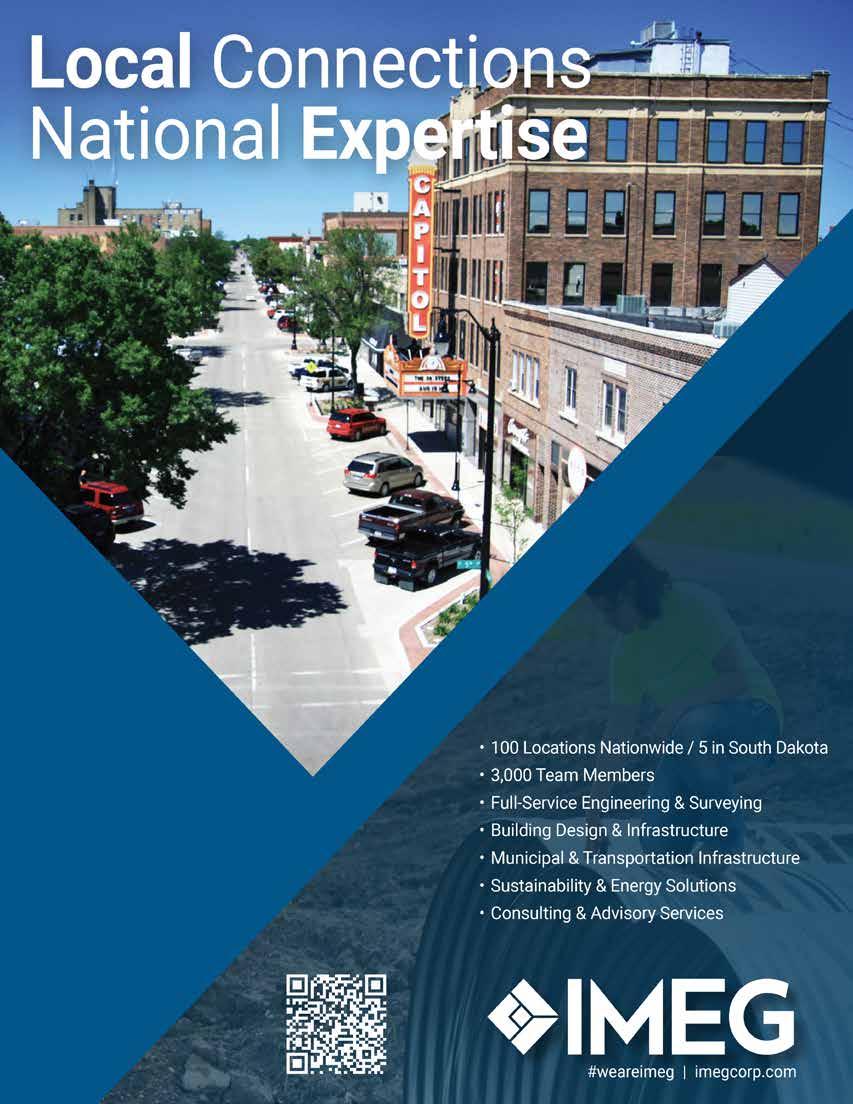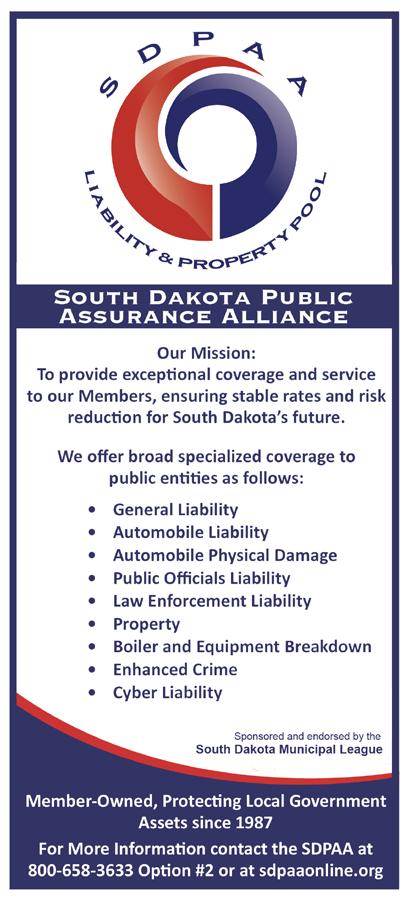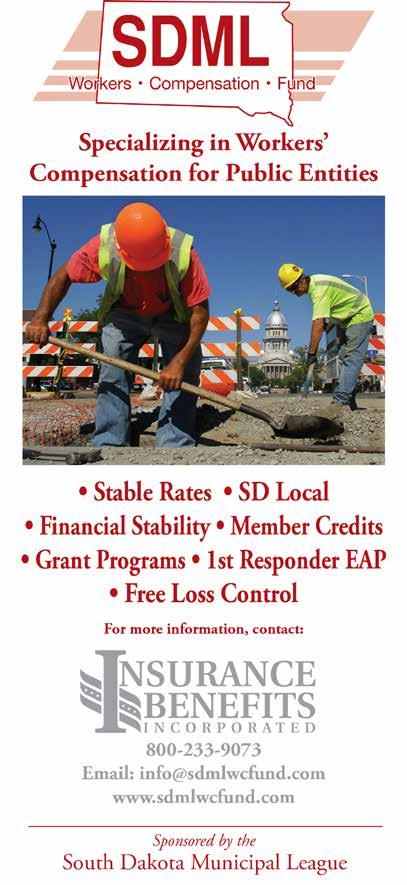




























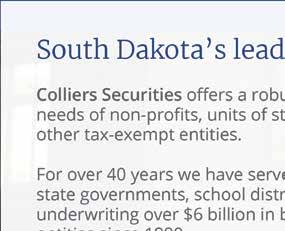



offers a robust foundation in serving the needs of non-profits, units of state and local government and
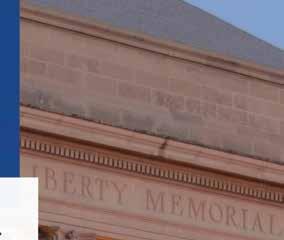
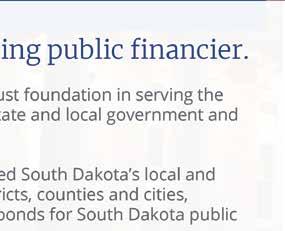
For over 40 years we have served South Dakota’s local and state governments, school districts, counties and cities, underwriting over $6 billion in bonds for South Dakota public entities since 1990.



Tom Grimmond
Sioux Falls, South Dakota
Phone
605.339.9800 | 800.339.1111
tom.grimmond@colliers.com
colliers.com other tax-exempt entities.

We look forward to serving your public finance needs! find us under services
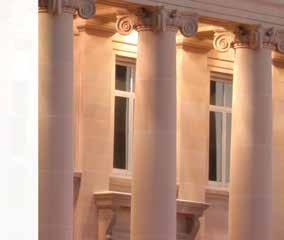








Toby Morris
Pierre, South Dakota
Phone
605.224.5557 | 877.224.5557
tobin.morris@colliers.com



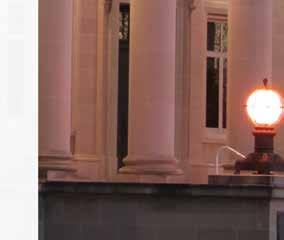

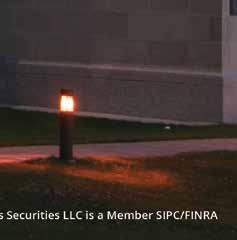
SARA RANKIN | SDML EXECUTIVE DIRECTOR
My dad was notorious for the age-old adage “what's good for the goose is good for the gander,” and if you’ve ever spent any time in conversation with me, you know the apple didn’t fall far from the tree. That saying perfectly captures my belief that our strength lies in our collective voice — a voice that becomes even more powerful when we work alongside partners who share our commitment to building strong, resilient communities.
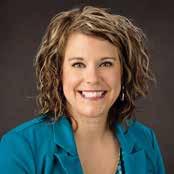
At SDML, we know that the challenges and opportunities facing our cities and towns don’t stop at city limits. Housing, workforce recruitment, infrastructure, and economic growth are regional issues that demand regional solutions. That’s why we actively collaborate with the South Dakota Association of County Commissioners, the Associated School Boards of South Dakota, local economic development groups, and the South Dakota Chamber of Commerce and Industry. By sharing expertise and aligning our advocacy efforts, we ensure that local governments, educational institutions, and the business community can move forward together.
During the legislative session, these partnerships are particularly vital. Whether we’re supporting key investments in workforce housing, protecting local control, or advocating for sustainable funding mechanisms, a united front amplifies our message in Pierre.
Beyond legislation, our associations work hand in hand to provide training, share data, and promote leadership development across sectors. We believe that when local leaders are empowered and informed, our entire state benefits.
These relationships are built on a foundation of mutual respect and a shared vision: a South Dakota where every community — large or small, urban or rural — has the tools and support needed to succeed. We each bring unique perspectives and strengths to the table, but we are driven by common goals: strong local economies, quality education, and vibrant, safe places to live and work.
We look forward to continuing this collaborative work, knowing that when we stand together with our like-minded partners, we can tackle even the toughest challenges and seize the brightest opportunities for all South Dakotans. ■
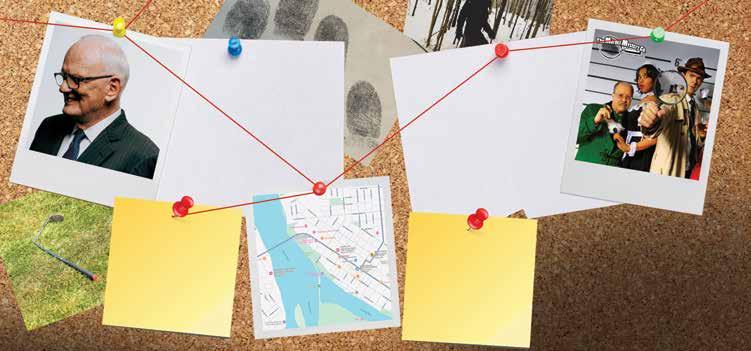









PRESIDENT
Carolynn Anderson Finance Officer, Wall
1st VICE PRESIDENT
Leland Treichel
President of the Board, Roscoe
2nd VICE PRESIDENT
Michelle DeNeui Finance Officer, Spearfish TRUSTEES
Paullyn Carey
Finance Director, Huron
Lance Lehmann Councilmember, Rapid City
Dawn Murphy Finance Officer, Tea
Richard Thomason, Councilmember, Sioux Falls
Laurie Woodward
City Administrator/Finance Officer, Custer
PAST PRESIDENT
Harry Weller Mayor, Kadoka
Sara Rankin
Dist. 1 | Mike Grosek Mayor, Webster
Dist. 2 | Jameson Berreth
City Administrator, Madison
Dist. 3 | Derick Wenck Mayor, Harrisburg
Dist. 4 | Shauna Meyerink, Finance Officer, Platte
Dist. 5 | Kristi Honeywell, City Administrator, Pierre
Dist. 6 | Rick Boschee Mayor, Bowdle
Dist. 7 | Gary Weismantel Mayor, Herreid
Dist. 8 | Brittany Smith City Administrator, Philip
Dist. 9 | Misty Summers-Walton Finance Officer, Hot Springs
Dist. 10 | Gina Carpenter Human Resources Officer, Belle Fourche
Executive Director
Lori Butler Deputy Director
Jessica Carr Director of Member Engagement
Emilie Miller Director of Marketing and Communications
Lisa Nold Director of Risk Sharing Services
Rob Peterson Director of Municipal Electric Services
Kristi Osterkamp Senior Accountant
Jackie Lopour
Accounting Assistant
Krista Kerns Member Accounts Manager
SD Public Assurance Alliance
Lynn Bren
Executive Director
Kristina Peterson Deputy Director
Becky Brunsing Member Services Representative
Hampton Iverson Member Services Representative
Paytra Nichols Underwriter
CAROLYNN ANDERSON | SDML PRESIDENT
I hope those who attended the July Elected Officials Workshop found it valuable and had the opportunity to connect with fellow officials. The ability to learn from each other’s experiences is often more impactful than searching for answers in a book or online. There’s real wisdom in shared stories and firsthand knowledge.
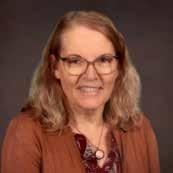
I recently stepped away from the school board after serving for 18 years. It was an honor to be part of that work, but I felt the time had come for someone younger and with school-age children to step into that role. When our current superintendent joined the district three years ago, she quoted something I said that still rings true: even after 15 years on the board, I was still learning. That mindset stayed with me throughout my service.
I believe that elected officials and municipal employees are always learning — whether they’ve been in their roles for over 20 years or are just beginning their careers/service to their communities. We are fortunate to live in a time of change, where continuous learning is not only necessary but encouraged. Embracing that mindset helps us better serve those who count on us.
As we move further into August, policy committee meetings will be getting underway, which is another great opportunity to learn and get involved.
Remember that Aug. 15 is the deadline to submit nominations for an elected official who deserves to be recognized for their dedication, hard work, and service to their community. I’m sure it’s no easy task for the Excellence in Municipal Government Award committee to choose just one honoree, but that's a wonderful problem to have. Thank you to the committee members for the thoughtful work you do.
Until next month! Respectfully, Carolynn Anderson
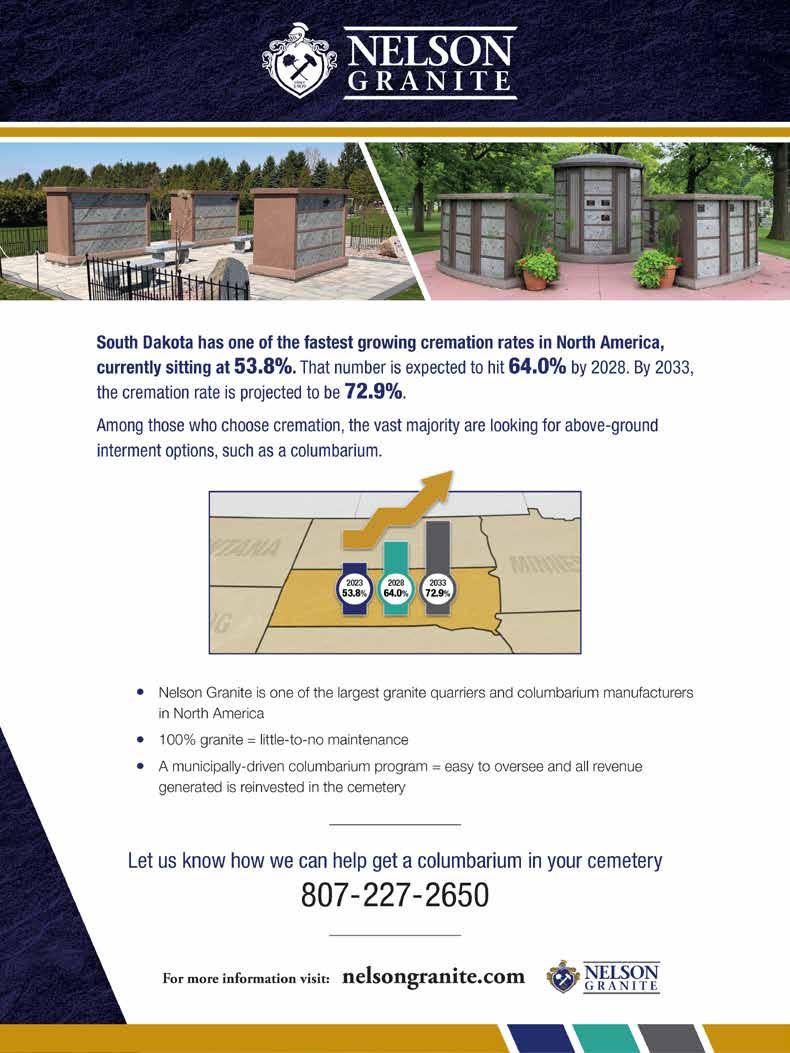
Starting in 2026, a new state law changes how and when municipal elections are held in South Dakota.
• In even-numbered years, beginning with 2026, cities must choose to hold their municipal elections on either the statewide Primary Election Day (June 2, 2026) or on General Election Day (November 3, 2026). This pattern will continue for all future even years.
• In odd-numbered years, starting in 2027, cities have the flexibility to hold elections on either June 8, 2027, or November 2, 2027. These dates align with the first Tuesday after the first Monday in June and November. During odd-numbered years, municipalities may also combine their election with the local school district.
• Municipalities are not obligated to match their election date with other local entities like school boards or counties. The only legal requirement is to pick one of the designated June or November dates.
• While municipalities can choose to coordinate their elections with county or school elections to simplify logistics and potentially lower costs, it’s entirely optional.
• No candidate for elective municipal office may be nominated unless the candidate files a nominating petition with the finance officer no later than 5 p.m. on the Tuesday seventy days before the date of the election.
• A nominating petition may not be circulated more than four months before the election.
• If a municipality schedules an annual election on the first Tuesday after the first Monday in November, each office holder whose term was to expire earlier in that year shall have the term extended until the office holder or another candidate for the office is duly elected and qualified. Same would apply to those elected officials who would have been done with their term or up for reelection in April 2026 but chose a June election day.

• We encourage municipal leaders to start conversations with their county auditor(s) as early as possible before selecting an election date. If your city usually finalizes its election date early in the calendar year, consider holding off until after these discussions.
• Municipalities should complete their official election canvass in accordance with SDCL 9-13-24 so that newly elected members can take office promptly at the next regular meeting.
• It is essential to work closely with your city attorney to review local election ordinances and ensure compliance with the updated state law.
• The Secretary of State’s office will continue to offer updated election calendars, detailed guidance, and training opportunities to help municipalities navigate these changes smoothly.
• We strongly recommend that municipal election officials participate in these and any other training sessions and stay current with all newly released resources. ■

This elected officials segment serves as an introduction to municipal government for newly elected and appointed officials and a refresher for veteran officials. This segment is not intended to be all encompassing. Refer to the SDML’s Handbook for Municipal Officials for a more detailed outline of the statutes that pertain to municipal government.

The South Dakota Municipal League (SDML) was organized in 1934 as a nonpartisan, nonprofit association of incorporated municipalities in South Dakota.
The League’s mission is the cooperative improvement of municipal government in South Dakota. A vote of the members at the annual conference determines the League’s major policies. A 19-member governing body elected from among the members carries the responsibility of implementing these policies. A full-time executive director and staff administer the policies in their service to all members. By cooperating through the League, South Dakota municipalities provide themselves with a strong research program and an effective legislative voice.
The League’s primary source of financing comes through the membership dues paid by cities, towns, and affiliated organizations. The dues payments are based on population. Other Leaguesponsored activities and the sale of publications help generate additional revenue.
Perhaps the most widely used service is individualized problem-solving assistance. Municipal officials may contact the League office with any question or problem. A library of extensive municipal information and
experience covering years of city history is at every member’s disposal through the League hotline. From Americans with Disability Act to zoning, the League staff is ready and willing to help you with any problem.
The SD Municipal League is grouped into 10 districts. A list of cities that comprise each district can be found online at www.sdmunicipalleague.org.
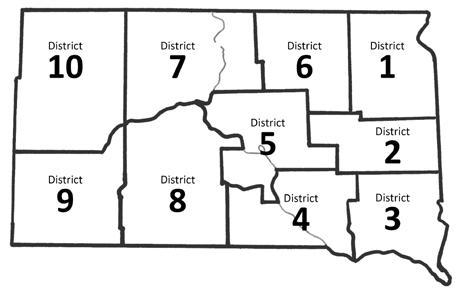
Each month, officials of member municipalities receive South Dakota Municipalities, the official magazine on issues that affect municipal operations daily. Member municipalities may place classified ads in the magazine and on the League’s website at no charge.
The Handbook for South Dakota Municipal Officials, developed with municipal officials in mind, represents the most complete and authoritative digest of South Dakota municipal laws available. The handbook remains current through staff-compiled annual updates.
Other publications available include:
• Guide to South Dakota’s Open Meetings Law
• Sample Personnel Policies
The legislative program is a predominant activity for the SDML. Throughout the year, the League staff works closely with legislators and committees toward the enactment of laws favorable to municipal governments. The League is the recognized legislative voice for the South Dakota municipalities.
As more programs shift from the federal level to the state and local level, a strong relationship with state officials has gained significance. The League acts as a liaison between municipal, county, and state governments to help meet this need. The League helps coordinate contacts between municipal and state officials.
Municipal officials meet regularly at the SDML Annual Conference and at 10 district meetings. These forums provide
training in city government, as well as an opportunity to exchange ideas and hear outstanding speakers on municipal affairs. Further, the League sponsors or co-sponsors several training schools, programs, and special meetings, including:
• Governmental Finance Officers’ School
• Governmental Human Resource School
• Elected Officials Workshop
• Election Workshops
• Annual Report Workshops
The League’s website, www. sdmunicipalleague.org, is a wealth of information at your fingertips. Find the latest news, event information, and much more. The library section has resources on everything from code enforcement and elections to special assessments.
As a member of the National League of Cities, SDML is able to cooperate with the NLC and 48 other state leagues on matters of national interest. This membership makes available to the South Dakota Municipal League the publications and library of NLC and brings valuable assistance and information on federal regulations and programs, as well as congressional representation.
The South Dakota Municipal League has established several programs to assist municipalities with cash management and investments, and with rising liability and insurance costs.
The SDML sponsors three-risk sharing pools. The SDML Workers’ Compensation Fund was created
in 1987. The South Dakota Public Assurance Alliance (SDPAA) has been providing liability and property coverage since 1987. The Health Pool of South Dakota (HPSD) was created July 1, 1995.
In 1991 the League endorsed the South Dakota Public Funds Investments Trust (FIT). This program assists local governments with their cash management and investment needs. Municipalities are using the FIT program as their tool for highly competitive rates, excellent service, flexible cash management options, sound investment advice, and a growing return on their funds. The FIT program representative can be reached at 800-658-3633. ■
Several organizations enjoy the benefits of being affiliate members of the South Dakota Municipal League. These organizations hold their meetings at the League’s annual conference and receive SDML staff support.
• SD Airport Management Association
• SD Municipal Attorneys’ Association
• SD Building Officials’ Association
• SD City Management Association
• SD Association of Code Enforcement
• SD Municipal Electric Association
• SD Governmental Finance Officers’ Association
• SD Governmental Human Resource Association
• SD Police Chiefs’ Association
• SD Municipal Street Maintenance Association

Municipalities have many powers listed in South Dakota law. For more details, refer to the SDML’s Handbook for Municipal Officials and to South Dakota Codified Laws.
It is extremely important to keep in mind that although a municipality has many powers, there are almost always conditions and restrictions on the use of those powers.
Municipal government is primarily governed by the provisions of Title 9 of South Dakota Codified Law, but several other chapters of law apply to municipalities. Title 9 and other codified laws are available online at http://sdlegislature.gov/ Statutes/Codified_Laws/default.aspx.
There are 309 incorporated municipalities in South Dakota. They are grouped according to two different factors: population and form of government.
There are three classes of municipalities:
• First Class: Those with populations of 5,000 or over. There are 18 first class municipalities.
• Second Class: Those with populations between 500 and 4,999. There are 98 second class municipalities.
• Third Class: Those with populations of 500 or less. There are 193 third class municipalities.
There are some cases where the size of the municipality determines what it may or may not do, but generally laws governing municipal government apply to all municipalities, regardless of size.

There are five forms of government in South Dakota, all five are briefly outlined here:
1. Trustee Form: Between three and five board members are elected at-large for three-year terms. The Trustees elect one of their own members to serve as the president of the board for a one-year term. There are 163 Trustee Municipalities in South Dakota.
2. Aldermanic Form: These municipalities are governed by a common council, which consists of a mayor who is elected at-large and two aldermen from each ward. Terms of office are traditionally two years but may be set by ordinance for up to five years. There are 122 Aldermanic Municipalities in South Dakota.
3. Commissioner Form: The board of commissioners consists of a mayor and two or four commissioners who are all elected at-large. The terms of office are determined by ordinance but may not exceed five years. There are 11 Commissioner Municipalities in South Dakota.
4. City Manager Form: These municipalities are either aldermanic or commissioner form but employ a city manager. In the Aldermanic Form with a City Manager, the mayor and alderman are elected in the same manner as described above. In Commissioner Form municipalities that employ a city manager, the number of commissioners is nine, each elected for a three-year term. There are six municipalities that utilize the city manager form of government: Aberdeen, Brookings, Sturgis, Vermillion, Watertown, and Yankton
5. Home Rule: There are 11 municipalities which have adopted a home-rule charter: Aberdeen, Beresford, Brookings, Elk Point, Faith, Fort Pierre, Pierre, Sioux Falls, Springfield, Vermillion, and Watertown. A home rule charter must be adopted by a majority vote of the electors of the municipality. Article IX of the South Dakota Constitution states, “A chartered governmental unit may exercise any legislative power or perform any function not denied by its charter, the Constitution or the general laws of the state. The charter may provide for any form of executive, legislative and administrative structure that shall be of superior authority to statute, provided that the legislative body so established be chosen by popular election and that the administrative procedures be subject to judicial review. Powers and functions of home rule units shall be construed liberally.”





The common council consists of the mayor elected at large and two aldermen elected from and by the voters of each ward of the municipality. The term of office is two years, unless a municipality adopts an ordinance establishing the term of office to be three, four, or five years. The mayor and aldermen hold office until their successors are elected and qualified. (SDCL 9-8-4). A person may be nominated, elected, or appointed as a mayor or as an alderman if the person is a citizen of the United States, a voter of and resident of the municipality, and, if an alderman, a voter of and resident of the ward for which the person is to hold office. (SDCL 9-8-1.1)
In 2022, Legislature passed a law allowing municipalities of the 2nd or 3rd class to choose to elect aldermen to the common council at large, following a majority vote at an election using processes provided in SDCL 9-11-6.
If there is a vacancy in the office of the mayor, the vacancy shall be filled by appointment by a majority vote of the aldermen, as soon as practicable after the vacancy occurs, to
serve until the office is filled by election for the unexpired term at the next annual municipal election or by special election as provided in SDCL 9-13-14.2.
Until the vacancy is filled or during the time of temporary disability of the mayor, the powers and duties of mayor shall be executed by the president of the city council. (SDCL 9-8-2)
When a vacancy exists on a municipal governing body, the remaining members shall appoint a replacement to serve until the next annual municipal election, or the vacancy may be filled by special election as provided in SDCL 9-13-14.2. In the aldermanic form, the appointment must be a person from the same ward of the first- or second-class municipality. There are also special provisions available for temporarily filling a vacancy caused by a member of the governing body being called to active duty (SDCL 3-4-8) or in cases where a member is incapacitated by illness or accident. (SDCL 3-4-9)
Mayor, President, and Vice President
The mayor holds office for a term of not less than two nor more than five years as determined by ordinance. (SDCL 9-8-1)
The mayor presides at all meetings of the council but only
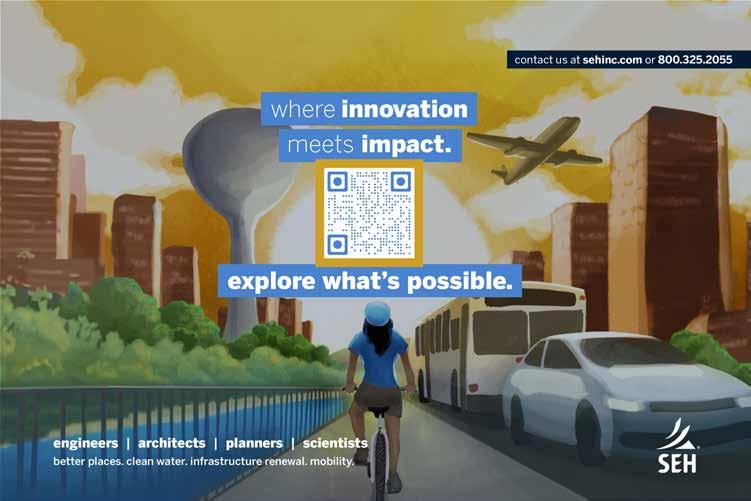
votes in case of a tie. The mayor performs other duties as may be prescribed by the laws and ordinances and takes care that the laws and ordinances are faithfully executed. The mayor shall annually, or as may be necessary, give the council information relative to the affairs of the municipality, and recommend for the council's consideration the measures the mayor deems expedient. The mayor may sign or veto any ordinance or resolution passed by the common council and may veto any part or item of an ordinance or resolution appropriating money. (SDCL 9-8-3)
The veto, with written objections, must be filed with the finance officer within ten days after final passage (SDCL 9-19-10). The vetoed ordinance or resolution must then be presented by the finance officer, with the mayor’s written objection, to the council at their next meeting for reconsideration. If the ordinance or resolution passes by a two-thirds vote of the aldermen, it shall be published and become effective. (SDCL 9-19-11)
At the first regular meeting after the annual election in each year and after the qualification of the newly elected aldermen, the council shall elect from among its members a president and vice president, who shall hold their respective offices for the municipal year. The president of the council in the absence of the mayor acts as the presiding officer of the council. During the absence of the mayor from the municipality or the mayor's temporary disability, the president of the council is acting mayor and has all the powers of the mayor. In the absence or disability of the mayor and president of the council, the vice president of the council shall perform the duties of the mayor and president of the council. However, the president of the council or vice president of the council acting as the mayor shall only vote as an alderman. No alderman acting as mayor may vote as the mayor to break a tie vote. (SDCL 9-8-7)
The council holds its regular meetings on the first Monday of each month but may, by ordinance, change the day of its regular monthly meetings. The council may prescribe by ordinance the manner in which special meetings may be called. A majority of the aldermen constitutes a quorum to do business. When a seat on a council is vacant due to removal, resignation, death, or by operation of law, the quorum consists of the majority of the remaining aldermen who are qualified to serve as aldermen by election or appointment pursuant to chapter 9-13.
The council may compel the attendance of absentees under such penalties as may be prescribed by ordinance. The meetings of the council are open to the public and it shall keep a journal of its proceedings. (SDCL 9-8-10) No official may participate in discussing or vote on any issue in which they have a direct pecuniary interest. (SDCL 6-1-17)
Download free Elected Officials’ Orientation Packets customized for each form of government. Go to the Library section of www.sdmunicipalleague.org.
Each packet includes information on:
• Municipal Powers
• Ordinances and Resolutions
• Open Meetings Laws
• Open Records

• Rules of Order
• Finances and Budgeting
• Revenue Sources
• Bids and Contracts
• Liquor Licensing
The Elected Officials Workshop is held each July. Presentations from the most recent workshop can be found in the Library Section of the SDML website.
Under the commission form, where a city manager is not employed, the board of commissioners shall consist of the mayor and two or four commissioners elected at large. (SDCL 9-9-1) The commissioners must be citizens of the United States and residents and voters of the municipality. (SDCL 9-9-2)
Terms of Office
The term of office of the members of the board may not exceed five years as determined by ordinance. (SDCL 9-9-3)
If the mayor or a commissioner resigns, the resignation shall be submitted in writing to the board. If the mayor or a commissioner moves his or her permanent residence outside the corporate limits of the municipality the office is immediately vacated. A vacancy on the board is filled by appointment as provided in SDCL 9-13-14.1 or by special election pursuant to SDCL 9-13-14.2. (SDCL 9-9-6; See Hdbk. Sec. 5.385; Sec. 5.350)
If the office of mayor is vacated, the board of commissioners shall appoint by a majority vote one of its commissioners as acting mayor. The acting mayor has all the powers and duties of the mayor until the election of a mayor at the next annual election or by special election pursuant to SDCL 9-13-14.2. The acting mayor has only one vote as a commissioner and may not vote as acting mayor. (SDCL 9-9-6; 9-9-8)
If the mayor is unable to perform the duties of office by reason of absence or sickness, the board shall appoint by a majority vote one of its members to act as mayor. The appointed commissioner’s official designation shall be ‘acting president of the board of commissioners.’ The acting president is invested with all the powers and duties of the mayor during the mayor’s absence or sickness but has only one vote as a commissioner and may not vote as acting mayor. (SDCL 9-9-8)
A vacancy is created if no one, including an incumbent, files a petition. The vacancy shall be filled by special election or appointment. (SDCL 9-1314.1; 9-13-14.2; 9-13-14.3)
Three Commissioner Municipalities
In a three-commissioner city, the mayor is the chief executive officer of the municipality, shall preside over all meetings of the board, and has general supervision over all departments and officers. In the absence or inability of a commissioner, the mayor shall temporarily take charge. (SDCL 9-9-26) All matters not designated to the mayor are to be divided as evenly as practicable between the other two commissioners by resolution adopted by a majority vote at the first meeting of the board in the month following the election in each year. (SDCL 9-9-27)
Five Commissioner Municipalities
In a five-commissioner city, the commissioners shall designate by a majority vote a Commissioner of Public Safety, a Commissioner of Public Works, a Commissioner of Utilities, and a Commissioner of Finance and Revenue, with each commissioner having oversight in each respective area as described by law. (SDCL 9-9-18 to 9-9-24)
The mayor's responsibility is to be the chief executive of the municipality. The mayor presides at all meetings of the board and has the power in the absence or inability of a commissioner to temporarily take charge of the department under the control of the
absent commissioner. The mayor is charged with the responsibility to supervise all public buildings, and all city parks except in municipalities having a park board, and for the lighting of the streets, alleys, and public buildings, and to enforce all the laws of the municipality, and must from time to time recommend measures which the mayor deems expedient to the operations of the municipality. (SDCL 9-9-20)
The Commissioners (Five-Commissioner Form)
The Commissioner of Public Safety
The commissioner of public safety shall supervise the police and fire departments and of the departments’ officers and employees. The commissioner of public safety is also in charge of animal control within the municipality, including animal impoundments and shelter. (SDCL 9-9-21)
The Public Works Commissioner
The commissioner of public works shall supervise the streets, alleys, public grounds, and municipal improvements, and all public property, except as otherwise specially provided The commissioner shall maintain the property in a clean and sanitary condition, and enforce all contracts, rules, and regulations necessary. (SDCL 9-9-22)
The Commissioner of Finance and Revenue
In a municipality with a five-member board, the commissioner of finance and revenue shall enforce all laws for the assessment and collection of taxes

of every kind and collection of all revenues belonging to the municipality from whatever source the same may be derived. The commissioner of finance and revenue shall examine into and keep the board informed as to the finances of the municipality and as to its assets and property (SDCL 9-9- 24)
The utilities commissioner shall supervise the construction, maintenance, and operation of the waterworks, sewerage, and any other utility departments of the municipality. The commissioner of utilities shall enforce all regulations with respect to that department and its revenue. (SDCL 9-9-23)
The board of commissioners is required to meet at least once each week or as otherwise determined by ordinance. (SDCL 9-9-11) A majority of the board constitutes a quorum to do business. If a seat on the board is vacant due to removal, resignation, death, or by operation of law, the quorum consists of the majority of the remaining commissioners who are qualified to serve. The board may compel the attendance of any absentee under penalties as prescribed by ordinance. No action of the board is effective unless approved by a vote of a majority of the board. (SDCL 9-9-14)
A special meeting may be called at any time by the mayor or upon the request of two commissioners to consider only the matter mentioned in the call for the meeting. Notice of a special meeting must be given pursuant to SDCL 1-251.1 and shall be provided to each commissioner. (SDCL 9-9-12)
Each meeting of the board is open to the public and the board shall keep of journal of its proceedings. (SDCL 9-9-13)
No official may participate in discussing or vote on any issue in which they have a direct pecuniary interest. (SDCL 6-117; See Hdbk. Sec. 13.125)
The board shall determine the board’s rules of procedure and may punish the board’s members for disorderly conduct. The board may, by resolution, establish
requirements for attendance at regular meetings and provide for the expulsion of a member in violation of the attendance requirements. (SDCL 9-9-14.1)
Composition and Qualification
The common council consists of the mayor elected at large and two aldermen elected from and by the voters of each ward of the municipality. The term of office is two years, unless a municipality adopts an ordinance establishing the term of office to be three, four, or five years. The mayor and aldermen hold office until their successors are elected and qualified. (SDCL 9-8-4). A person may be nominated, elected, or appointed as a mayor or as an alderman if the person is a citizen of the United States, a voter of and resident of the municipality, and, if an alderman, a voter of and resident of the ward for which the person is to hold office. (SDCL 9-8-1.1)
If there is a vacancy in the office of the mayor, the vacancy shall be filled by appointment by a majority vote of the aldermen, as soon as practicable after the vacancy occurs, to serve until the office is filled by election for the unexpired term at the next annual municipal election or by special election as provided in SDCL 9-13-14.2.
Until the vacancy is filled or during the time of temporary disability of the mayor, the powers and duties of mayor shall be executed by the president of the city council. (SDCL 9-8-2)
When a vacancy exists on a municipal governing body, the remaining members shall appoint a replacement to serve until the next annual municipal election, or the vacancy may be filled by special election as provided in SDCL 9-13-14.2. In the aldermanic form, the appointment must be a person from the same ward of the first- or second-class municipality. There are also special provisions available for temporarily filling a vacancy caused by a member of the governing body being called to active duty (SDCL 3-4-8) or in cases where a member is incapacitated by illness or accident. (SDCL 3-4-9)
The mayor shall be president of the board and shall have a vote upon all questions but shall not have the right of veto. (SDCL 9-10-7) The Mayor is also the recognized head of the municipality for service of civil process and for military and ceremonial purposes; has emergency powers during times of public danger or emergency; and may have other duties prescribed by ordinance or resolution that are not inconsistent with the city management form of government. (SDCL 9-10-7)
The city manager is responsible for the administration of all affairs of the municipality which are placed in his care. He can appoint or remove all officers or employees in the administrative service of the municipality. (SDCL 9-10-13)
Further responsibilities of the city manager are to:
1. See to the enforcement of the law and ordinances;
2. Supervise the administration of the affairs of the municipality;
3. Make recommendations to the governing body;
4. Advise the governing body of the financial status of the municipality;
5. Prepare an annual budget;
6. See that all terms and conditions in any contract or franchise are kept;
7. Be present at all meetings of the governing body, except when the governing body is considering his removal;
8. Sign all warrants after approval by the governing body, which warrants must then be counter signed by the finance officer;
9. Prepare and introduce ordinances and take part in discussion, but he does not have the power to vote;
10. Carry out any further powers and duties prescribed by ordinance or resolution. (SDCL 9-10-15)
The council holds its regular meetings on the first Monday of each month but may, by ordinance, change the day of its regular monthly meetings. The council may prescribe by ordinance the manner in which special meetings may be called. A majority of the aldermen constitutes a quorum to do business. When a seat on a council is vacant due to removal, resignation, death, or by operation of law, the quorum consists of the majority of the remaining aldermen who are qualified to serve as aldermen by election or appointment pursuant to chapter 9-13.
The council may compel the attendance of absentees under such penalties as may be prescribed by ordinance. The meetings of the council are open to the public and it shall keep a journal of its proceedings. (SDCL 9-8-10) No official may participate in discussing or vote on any issue in which they have a direct pecuniary interest. (SDCL 6-1-17)
Composition and Qualification
The board of trustees of a third-class municipality shall consist of not less than three nor more than five members elected at large. Each shall be a legally qualified voter of the municipality. The number of trustees of a municipality may be increased to five or reduced to three in the manner prescribed by Chapter 9-11. (SDCL 9- 7-1)
The members of the board of trustees shall qualify for office within ten days after the first meeting of the month next succeeding the election by filing an oath or affirmation of office. (SDCL 9-13-28, SDCL 3-1-5)
The members of the board of trustees shall hold office for three years and until their successors are elected and qualified. However, at the first election after incorporation, one trustee is
elected for one year, one trustee is elected for two years, and one trustee is elected for three years. At subsequent elections each trustee is elected for a term of three years. (SDCL 9-7-3)
When a vacancy exists on a municipal governing body, the remaining members shall appoint a replacement to serve until the next annual municipal election, or the vacancy may be filled by special election as provided in SDCL 9-13-14.2. There are also special provisions available for temporarily filling a vacancy caused by a member of the governing body being called to active duty (SDCL 3-4-8) or in cases where a member is incapacitated by illness or accident. (SDCL 3-4-9)
At the first regular meeting after their election, the trustees must elect one of their members to serve as president of the board of trustees. This term of office is for one year. (SDCL 9-7-5)
The board shall hold regular meetings at such times as may be provided by ordinance. Special meetings of the board may be held at any time upon call of the president or clerk by oral or written notice to the members present within the municipality. (SDCL 9-7-6) A majority of the members of the
board shall constitute a quorum, but no act of the board shall be effective unless assented to by a majority of the members. (SDCL 9-7- 7)
No official may participate in discussing or vote on any issue in which they have a direct pecuniary interest. (SDCL 6-1-17)
Download free Elected Officials’ Orientation Packets customized for each form of government. Go to the Library section of www.sdmunicipalleague.org.
Each packet includes information on:
• Municipal Powers
• Ordinances and Resolutions
• Open Meetings Laws
• Open Records
• Rules of Order
• Finances and Budgeting
• Revenue Sources
• Bids and Contracts
• Liquor Licensing
The Elected Officials Workshop is held each July. Presentations from the most recent workshop can be found in the Library Section of the SDML website. ■

Municipalities may enact, make, amend, revise, or repeal all such ordinances, resolutions, and regulations as may be proper and necessary to carry into effect the powers granted thereto (§9-19-3).
The word “ordinance” means a permanent legislative act within the limits of its powers of the governing body of a municipality (§9-19-1).
A resolution, on the other hand, means any determination, decision, or direction of the governing body of a municipality of a temporary or special character for the purpose of initiating, effecting, or carrying out its administrative duties and functions (§9-19-1). In the case of State ex rel. Wagner v. Summers, 33 S.D. 40, 54, 144 N.W. 730, 734 (1913) the Court ruled that the terms “resolution” and “motion” are practically synonymous.
Ordinances must be in the following style:
“An ordinance (insert title)”
“Be it ordained by the (city or town) of (insert the name of the municipality)” The substance of the ordinance follows (§9-19-6).
The governing body of each municipality must publish full accounts of its meetings. The publication is to appear in the official newspaper of the municipality, or if there is no offi cial newspaper, any legal newspaper which serves the municipality. The proceedings must be published within twelve business days after each meeting (§9-18-1). The publication must include a detailed statement of all expenditures of money, showing the names of all persons who received remuneration as well as the service provided (§9-18-1). It is further required that the finance officer deliver a copy of the proceedings to be published in the official newspaper within five business days from the date the meeting was held (§9-18-1.1).
Ordinances can only have one subject, which must be expressed in its title (§9-19-5). The formalities of style, reading, publication, and the effective date of ordinances are not applicable to resolutions (City of Brookings v. Martinson, 1933, 61 SD 168, 246 NW 916).
Municipalities are authorized to provide for the punishment of each violation of an ordinance, resolution, or regulation with a fine not exceeding five hundred dollars or by imprisonment not exceeding thirty days or by both such fine and imprisonment (§9-19-3).
All ordinances shall be read twice by title with at least five days between each reading. If passed, the ordinances shall be signed by the mayor or acting mayor or president of the board of trustees and filed with the finance officer. With few exceptions, ordinances, after being signed and filed, must be published at least once in the official newspaper (§919-7). The vote on the second reading of all ordinances must be recorded and published (§9-19-9).
Resolutions differ from ordinances in that any resolution may be passed after only one reading. The resolution must be published at length either separately or in the minutes of the meeting. The votes for and against the resolution must also be published (§9-19-8).
Unless an ordinance or resolution is drawn to take effect immediately upon passage, all ordinances and resolutions become effective on the twentieth day after passage and publication, unless suspended by operation of a referendum (§9-19-13).
Voters have the right to propose their own ordinances through the initiative process, or to refer any legislative decision of the governing body through the referendum process. ■
More information on these processes can be found in the Handbook for Municipal Officials or in §9- 20.

If a meeting is required to be open to the public, and if any printed material relating to an agenda item of the meeting is distributed before the meeting to all members of the governing body, the material shall either be posted on the governing body’s website or made available at city hall at least twentyfour hours prior to the meeting or at the time the material is distributed to the governing body, whichever is later. If the material is not posted to the governing body’s website, at least one copy of the printed material shall be available in the meeting room for inspection by any person while the governing body is considering the printed material. These requirements do not apply to materials exempt from disclosure or to printed material or records related to an agenda item of an executive or closed meeting (§1-27-1.16).
The law requires every municipal officer to keep a record of the official acts and proceedings of their office. These records must be open for public inspection during business hours under reasonable restrictions (§9-18-2).
Documentary material or data which consists of trade secrets, or commercial or financial information made or received by a municipality or an economic development corporation receiving municipal funds for the purpose of furnishing assistance to a business is not a public record (§9-34-19).
Patient information identifying the patient’s name, address, diagnosis, or treatment received by an ambulance is not a public record and is confidential (§34-11-5.1). ■
It’s just a meeting...right? Nothing to worry about...right? I just need to show up and vote...right?
Council meetings - although seemingly simple - can become complicated. Such meetings involve many procedures, statutory direction, and ethical obligations.
The open meeting law (SDCL Chapter 1-25) is intended to encourage public participation in government. The provisions of this idea are contained in three different statutes. Meetings are subject to the direction of these three statutes are those meetings of boards and commissions which are created by law OR which are entitled to receive revenue directly from public tax funds. Therefore, all your city meetings must comply with the open meeting requirements. Any time a legal quorum of your entity is discussing public business, meaning any matter relating to the activities of the entity, you must notify the public in the appropriate manner in the appropriate timeframe. This applies whether the discussion is in person, by telephone or any other electronic means.
SDCL 1-25-11 further states that recording of open public meetings is permitted. No state, political subdivision, or public body may prevent a person from recording, through audio or video technology, a public meeting that is open to the public as long as the recording is reasonable, obvious, and not disruptive.
The open meetings law requires that all public bodies prominently post a notice and copy of the proposed agenda, that is visible, readable, and accessible, at the organization’s principal office at least 24 hours PRIOR to the meeting. The notice shall also be posted on the public body’s website as soon as possible if one exists. Special provisions exist for special or rescheduled meetings. The notice must be delivered in person, by mail, by email, or by telephone, to all local news media that have asked to be notified (SDCL 1-25-1.1).
There are specific circumstances where a meeting can be closed to the public and the media (Executive Session). Such circumstances include (SDCL 1-25-2):
• The elected officials may discuss the qualifications, competence, performance, character or fitness of any officer or employee including prospective officers or employees. Contractors are not included in the term officer or employee.
• The elected officials may consult with their attorney or receive communication from their attorney about proposed or pending lawsuits or contract problems.
• The elected officials may prepare for labor negotiations with the municipality’s employees.
• The elected officials may discuss marketing or pricing strategies of a business owned by the municipality (electric, liquor, telephone, etc.) if public discussion may be harmful to the competitive position of the business. This includes utility boards.
• The elected officials may discuss information listed in subdivisions 1-27-1.5(8) and 1-27-1.5(17).
In addition, when a municipality or an economic development corporation receiving municipal funds is considering furnishing assistance to a business and has made or received material or data consisting of trade secrets or commercial or financial information regarding the operation of that business, such discussion or consideration may be done in executive session closed to the public (SDCL 9-34-19).
Please keep in mind, however, no official action (votes) may be taken in such a private meeting and you must disclose the purpose of the executive session. Such purpose must be included in the minutes of the meeting (SDCL1 25-2).
In order to go into an executive, or closed, meeting a majority vote of the governing body is required. The matters discussed during the executive meeting are restricted to the purposes specified in the motion to go into executive session.
An open meetings commission has been established by the Attorney General’s Office to investigate and determine whether a violation occurred. Additional information regarding this set of laws can be found on the SDML website. The Attorney General’s website (http://atg.sd.gov) also has further information regarding the laws.
All municipalities are encouraged to establish some model under which to operate... whether this is Robert’s Rules of Order or some other procedure. Although state law provides certain parameters regarding how business items are handled, the city has some discretion over their parliamentary procedure. These procedures might govern everything from rules for public participation to how motions are made.
To conduct business, the city council takes one of three actions: motions, resolutions or ordinances. Ordinances are a permanent legislative act within the limits of municipal power. A resolution on the other hand means any determination, decision, or direction of the governing body of a municipality of a temporary or special character for the purpose of initiating, effecting, or carrying out its administrative duties and functions. Resolutions and motions are practically synonymous.
To conduct any business a quorum must first be present. A quorum is a majority of the elected body. Then, a majority of the elected body must affirmatively vote on a particular action for passage. Reading and publishing requirements follow the introduction of an ordinance or resolution. Unless an ordinance or resolution is drawn to take effect immediately upon passage, all ordinances and resolutions become effective on the 20th day after passage and public action. ■
This is only a summary; consult the League’s Handbook for Municipal Officials for more details.
Statute indicates resources a municipality is permitted to receive. Further, statutes expressly and/or implicitly state the purposes for which those resources may be used. All resources received and spent shall be according to the law. For this reason, municipalities have evolved a means of indicating legal compliance by use of “fund accounting.” (Municipal Accounting Manual, produced by SD Department of Legislative Audit)
Cities must hire a finance officer that looks after Municipal Funding, keeps books and oversees various other aspects of city business. Despite,
however, the hiring of a brilliant, intuitive finance officer elected officials are urged to become generally familiar with Municipal Funding. All government, regardless of its level, is based upon the old checks and balances idea. If you don’t get involved and learn about all aspects of your city’s business, you cannot be an active participant in that balancing system.
The term “Fund” is defined as “a fiscal and accounting entity with a selfbalancing set of accounts recording cash and other financial resources, together with all related liability and residual equities or balances, and changes therein, which are segregated for the purpose of carrying on specific activities or attaining certain objectives in accordance with special regulations,
restrictions or limitations.” (Defined by The Governmental Accounting Standards Board.)
Municipalities are charged with a diverse set of obligations, and therefore the checks and balances system is essential and necessary when determining legal compliance. The required accounts are organized on the basis of funds, each of which is completely independent of any other. Each fund must be so accounted for that the identity of its resources, obligations, revenues, expenditures, and fund equities is continually maintained. Funds are classified according to the source of revenue and the type of activities they finance. Funds of a similar nature are classified according to fund groups.
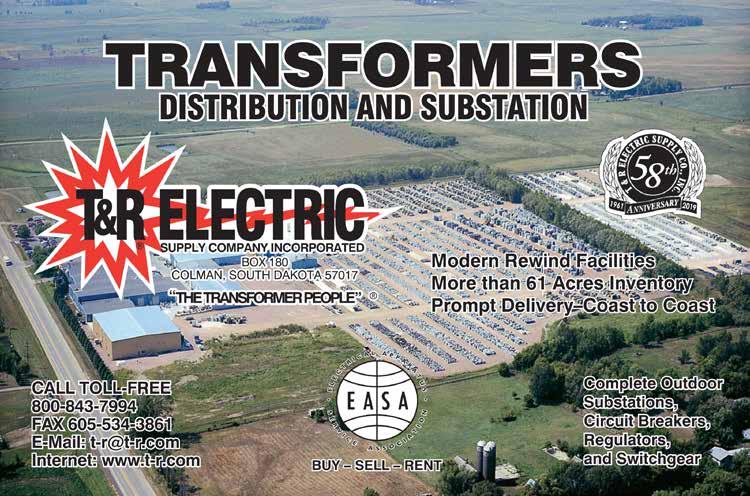
This is only a summary; consult the League’s Handbook for Municipal Officials for more detail.
The municipal fiscal year begins January first. South Dakota statutes require, as preparation for the budget, an estimate of expenditures and revenues for the ensuing year to be reported on or before the first day of September. The finance officer should report this estimate to the governing body. Cities that employ a city manager are, however, exempt from this rule and must submit an annual report to the governing body not later than August first of each year. In preparing this budget the finance officer may include a line item for contingencies (not to exceed five percent of the total budget). Expenses cannot be charged to this item, but by resolution budget authority can be transferred out where needed. In order to aid the finance officer in preparing the annual BUDGET the various boards and commissions are required to submit an annual report estimating the expenses to be incurred for the ensuing year.
No later than the first regular meeting of the governing body in September or within 10 days thereafter, the annual appropriations ordinance for the ensuing year must be introduced. As an alternative, a municipality may move the deadline for introducing the annual appropriation or budget to as late as the first regular meeting of the governing board in November. Each municipality that opts to move the deadline s shall, by ordinance, establish budget hearing and publication deadlines pursuant to § 9-19-7. (SDCL 9-21-34). The purpose of the appropriations ordinance is to appropriate such sums of money as may be deemed necessary to meet the lawful expenses and liabilities of the municipality. In specifying the functions and sub-functions made in the appropriations ordinance, the governing body is required to follow, as far as it is applicable, the classification of expenditures for each department and office of the municipality as prepared by the state department of legislative audit.
Bid Book Available A link to the Bid Booklet from the SD Department of Legislative Audit can be found in the SDML online library under Bid Laws Printed booklets are not available for order but can be printed from the link.
Neither the governing body nor any department can expend any sum in excess of the amount appropriated for any purpose within the department except as provided by SDCL 9-21-9.2, which provides that any authorized expenditures to be used for the benefit of another political subdivision shall be restored to the fund from which it was withdrawn. There are also exceptions for newly available funds due to the receipt of grant money. See SDCL 9-21-9 and 9.1.
Appropriation ordinances must be approved by a majority of all aldermen (the mayor cannot vote to break a tie), trustees or members of the board of commissioners. Some veto power does, however, exist. See SDCL 9-8-3 and 919-10 for more detail. Upon passage, the appropriations ordinance must be published in the same manner as all other ordinances. Please note that supplemental appropriation ordinances and emergency appropriation ordinances are appropriate under specific circumstances and may be passed in the event sufficient revenues are not available for an indispensable function of government.
The FINANCE OFFICER shall keep a separate account of each fund or appropriation and the debits and credits. Going back to the definition of a FUND ACCOUNT ... monies spent from such fund shall only be spent for the purposes for which the fund was established! There are procedures established to transfer funds, this requires a 2/3 vote of the governing body. AND the money transferred cannot be expended for any purpose not authorized by the annual appropriations ordinance.
Before any money can be spent an itemized in voice must be presented along with a voucher verified by the appropriate municipal official. The invoice and voucher shall be filed in
the Finance Office. In addition, such expenditures shall be fully itemized and entered in governing body meeting minutes.
No money can be paid out of the treasury except upon the warrant of the mayor or president of the board of trustees and countersigned by the finance officer. In cities employing a city manager, the warrant must be signed by the manager and countersign ed by the finance officer before any sum can be paid.
As of July 1, 2012, cities are allowed to establish an incidental account from which advanced payment or claims requiring immediate payment may be made. The amount available in the fund is to be established by the governing body, with detailed account of expenditures to be presented not less than monthly. All expenditures from this account shall be listed with other bills in the regular proceedings of the governing body. All claims made on the incidental account require the signatures of two officers of the municipality (SDCL 9-23-23).
SDCL 9-22-21 requires the annual financial report to be submitted to the governing body at the first regular meeting of May and published within thirty days thereafter or upon completion of the annual audit. By the last day of May each year, the financial officer shall file a copy of the report with the Department of Legislative Audit.
The municipal annual report for smaller municipalities is designed to be a simplified financial report. SDCL 4-11-4 authorizes the auditor general to accept an annual report in lieu of a formal audit of the records of a municipality which receives less than six hundred thousand dollars in annual revenues and receives less than five hundred thousand dollars of federal financial assistance in any one year. As a result, small municipalities
should file the annual report forms with the Department of Legislative audit immediately after the report to the governing body.
Personal property inventories of all municipal departments shall be filed with the finance officer not later than January 10 of each year.
A complete list of salaries of all officers and employees should be published with the minutes of the first meeting in January or within thirty days thereafter. Added salaries of new employees and increased salaries of existing employees should be shown in the month in which they occur.
The due date for special assessment installments, which are payable under either Plan One or Plan Two option, is January first.
Urban renewal agencies are required to file an annual report on or before March 31 with the governing body and the Auditor General.

The finance officer shall at the first regular meeting in May present the annual report to the governing board and publish it within thirty days or upon completion of the annual audit. By the last day of May each year, the financial officer shall file a copy of the report with the Department of Legislative Audit.
Special assessment installments become delinquent on May first.
Not later than the first regular meeting of September or within ten days thereafter, the annual appropriation ordinance is introduced.
Between the fifteenth day of September and the first day of October, the auditor or finance officer must certify all Plan Two delinquent special assessments to the county auditor.
The tax levy must be certified to the county auditor on or before October 1.
The special assessment roll or all assessments payable under Plan One must be delivered to the county auditor no later than November 1.
Fiscal year ends December 31.
The Department of Legislative Audit provides an approval function for municipal audits in that engagements are approved up-front, and a draft of the final report is approved at the end of each audit. Audits of municipalities are performed by Independent Public Accountants or by the Department of Legislative Audit at least once every two years. Any city who receives an independent audit shall make the audit report available on their website.
Please note that in lieu of an audit, an “internal control review” is required to be performed at least once every five years in municipalities with revenues ranging from six hundred thousand dollars to one hundred thousand dollars.
Further, upon the request of the governing body or for special reasons the auditor general may audit the books and records of any office or any officer of the municipality, or upon request by a petition signed by twenty percent of resident taxpayers of a taxing district.
The Municipal Accounting Manual, produced by SD Department of Legislative Audit, can be found at http:// legislativeaudit.sd. gov/ under the Resources tab. ■
As a newly elected public official, the public arena may seem foreign. Not only are you charged with knowledge of your local ordinances and policies, but you must also feel comfortable with state statutes and policies. To assist both newly elected officials and those previously elected to office, the League publishes the Handbook for Municipal Officials. The handbook introduces newly elected officials to their new jobs and also serves as a reference manual throughout an official’s tenure in office. The handbook references state statutory law and Attorney General Opinions offering further commentary on state law.
To help newly elected officials get started and to help returning officials review their accepted duties, we have created the following timeline outlining important actions to take within the first 90 days of office.
• Check with the finance officer about being covered by a bond - a bond is required of certain elective and appointive municipal offers (SDCL 3-1-5). (Bond amount is determined by particular office and city size.)
• Learn about the South Dakota Open Meetings law and become familiar with bid laws and surplus property laws. Cities must follow specific procedures to acquire, dispose of or exchange property. You can find both of these topics under the Library tab on the League’s website, www.sdmunicipalleague.org.
• Become familiar with how your public office will affect your ability to become personally involved with areas of city concern.
• Request a detailed map of your city.
• Request and review a copy of the current city budget.
• Request a copy of the city code of ordinances and then review the table of contents so that you are somewhat familiar with what the code contains.
• Review city council meeting minutes from the previous three to six months.
• Meet your city employees.
• Review the most recent list of goals and objectives, if any, adopted by the city council.
• Talk with your fellow policy leaders and key staff members about the processes and methods used to effectively work together.
• Get to know the League. We are here as a resource.
• Review the current city budget and the most recent city audit, or annual financial report.
• Review a list of city employees that shows the name, job title, salary, and tenure of each person on the payroll. Compare this information with the salaries from surrounding communities of similar size. Are salaries reasonable?
• Read your city’s capital improvements plan or community builder plan or long-term projects list if they exist.
• Review the job descriptions on file for city employees.
• Review the city’s policy manuals and employment contracts. Do you have a personnel policy? Are you aware of any current human resource issues within the city? The SDML has Sample Personnel Policies available for purchase; contact the League at 800-658-3633.
• Request a copy of the city’s zoning and district map for your reference.
• Review your city’s civil defense plan and/or disaster preparedness and emergency response plan if one exists. If you do not have one, consider whether it is necessary.
• Read your city’s most recent water and wastewater inspection reports.
• Review your city’s urban renewal plans or urban renewal district plans, if any exist.
• Review your city’s comprehensive plan, if one exists.
• Review your city’s investment policy. As a great investment alternative, the League endorses the South Dakota Public Funds Investment Trust (FIT). Contact PMA Financial at the League (800-658-3633) regarding FIT or for a sample investment policy.
• Review your workers’ compensation and insurance policies - we can help with this too! Contact the League office at 800-658-3633. ■

City officials are required to abide by specific laws regarding behavior and business decisions to prevent situations involving a conflict of interest. There are several types of “conflict:” holding concurrent offices with conflicting interests, involvement in a government contract and personal or pecuniary interest in a vote. If identified and handled correctly a “conflict” is not an issue.
Each official shall decide if any conflict of interest requires such official to be disqualified from participating in a discussion or voting. So, if a conflict exists, how can an individual be impartial enough to make this judgment call? When you begin to have a personal vested interest in a particular issue, it may be time to voluntarily excuse yourself from the issue. It is part of your responsibility as an elected official to recognize when this exists and remedy it.
The law goes on to occasionally FORCE you to remove yourself. NO SUCH official may participate in discussing or vote on an issue if the following circumstances apply (SDCL 6-1-17):
The official has a direct pecuniary interest in the matter before the governing body or (this applies to any financial interest in the decision...such as family member employees, a new street in front of your business, etc.)
• At least 2/3 of the governing body votes that an official has an identifiable conflict of interest that should prohibit such official from voting on a specific matter.
• Next is the contract issue: It is unlawful for any public officer or their agent to be interested in any contract entered into by the municipality. There are, however, some exceptions to this rule (SDCL 6-1-2):
• Any contract involving five thousand dollars or less regardless of whether other sources of supply or services are available within the county, municipality, township, or school district, provided that the consideration therefore is reasonable and just.
• Any contract involving more than five thousand dollars but less than the amount for which competitive bidding is required, and there is no other source of supply or services available within the county, municipality, township, or school district provided that the consideration therefore is reasonable and just and further provided that the accumulated total of such contracts paid during any given fiscal year shall not exceed the amount specified in SDCL 5-l SA-14.
• Any contract with any firm, association, corporation, or cooperative association for which competitive bidding is not required and where other sources of supply and services are available within the county, municipality, township, or school district, and the consideration therefore is reasonable and just, unless the majority of the governing body are members or stockholders who collectively have controlling interest, or any one of them is an officer or manager of any such firm, association,
corporation, or cooperative association then any such contract shall be null and void;
• Any contract for which competitive bidding procedures are followed pursuant to SDCL 5-18A or 5-18B, and where more than one such competitive bid is submitted.
• Any contract for professional services with any individual, firm, association, corporation or cooperative, if the individual or any member of the firm, association, corporation, or cooperative is an elected or appointed officer of a county, municipality, township, or school district, whether or not other sources of such services are available within the county, municipality, township or school district, provided the consideration therefore is reasonable and just.
• Any contract for commodities, materials, supplies, or equipment found in the state price list established pursuant to SDCL 5-lSD-6 and 5- lSA-28, at the price there established or below.
• Any contract or agreement between a governmental entity specified in SDCL 6-1-1 and a public postsecondary educational institution when an employee of the Board of Regents serves as an elected or appointed officer for the governmental entity, provided that the employee does not receive direct compensation or payment as a result of the contract or agreement.
• Any contract with any firm, association, corporation, individual, or cooperative association for which competitive bidding procedures are followed pursuant to chapter 5-l SA, and where only one such competitive bid is submitted, provided the procedures established in SDCL 6-1-2.1 are followed.
All of the conditions in each subsection must be met fully in order for the contract to be valid (SDCL 6-1-2).
Another statutory exemption to the provisions of SDCL 6- 1-1 appears in SDCL 6-1-3. This statute allows a bank to be the official depository of funds notwithstanding that an officer, director, stockholder, or employee of a bank is an elected or appointed officer or treasurer of such county, municipality, township, or school district. (SDCL 6-1-3)

If competitive bidding procedures have been followed pursuant to chapter 5-18A, and the bid notice has been placed on the central bid exchange pursuant to SDCL 5-18A-13 for two weeks prior to the opening of bids, a bid from an officer of the governing body may be opened and accepted provided the consideration is reasonable and just as determined by the governing body or a disinterested governmental entity. (SDCL 6-1-2.1)
Finally, an elected official cannot hold concurrent offices if such positions are incompatible. The major lines of delineation in this area have been made by the Attorney General. For example, the Attorney General has determined that there are essentially four instances when offices are incompatible. They are: 1) when there are statutory prohibitions; 2) when one is subordinate to the other; 3) when one has supervision over the other; and 4) when the duties of the two offices are conflicting. (AGR 1949-50 , p.37)
However, the Attorney General has also determined that, while the determination of whether a person may hold two or more positions is usually based upon incompatibility or inconsistency, the question of incompatibility or inconsistency never arises when there is a special statutory prohibition. The rule that governs will change from situation to situation (AGR 1959-6 0, p.45).
Positions which are compatible include the following:
• Mayor and state’s attorney (AGR 1907-08, p. 215)
• Office of mayor and member of the board of county commissioners (AGR 1949-50, p. 37)
• Mayor and state senator (AGR 1949-50, p. 358)
• Treasurer of a school district and trustee of an incorporated municipality (AGR 1949-50, p. 75)
• Assessor and register of deeds (AGR 1949-50, p.56)
• Office of county commissioner and membership on the governing board of a municipality (AGR 1929-30, p. 278)
• Office of state’s attorney and city attorney (AGR 194950, p. 331)
• Municipality marshal and sheriff or deputy sheriff (AGR 1953-54, p. 84)
• Police magistrate and candidate for the state legislature (AGR 1953- 54, p. 292)
• Office of county clerk of courts and city councilman (AGR 1955-56 p. 68-9)
• Office of register of deeds and mayor (AGR 1955-56, p. 217)
• Office of county sheriff and peace officer of a municipality within the county (AGR 1955-56, p.420)
• Appointed municipality treasurer and treasurer of a school district (AGR 1959-60, p. 45)
• No mayor, alderman, commissioner, or trustee in a municipality is disqualified from holding office as a result of holding any liquor license (SDCL 9- 14-16)
• City council and county commission (AG Opinion 88-24)
• Any mayor, alderman, commissioner, or trustee may serve in a volunteer, unsalaried municipal position or provide any service for the municipality if the compensation for such service does not exceed $5,000 per calendar year (SDCL 9-14-16.1)
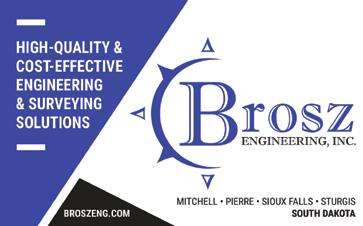
Positions which are incompatible include the following:
• No mayor, alderman, commissioner, or trustee shall hold any other office under the municipality while an incumbent of any such office. No auditor or clerk may hold the office of treasurer in the municipality while an incumbent of such office. (SDCL 9-14-16)
• A mayor may not be an attorney for a defendant in a criminal case for a crime committed within the municipality of which they are mayor. (State ex rel. Jones v. Taylor, 46 SD 354)
• A city councilman may not be the defense attorney or counselor for a defendant charged with the violation of a municipal ordinance or a state law where the facts would also be a violation of the laws of their municipality. (AGR 1953-54, pp. 184- 186)
• Member of municipality board and janitor of a municipal building (AGR 1932-34, p. 492)
• County judge and city attorney (AGR 1949-50, p. 133)
• Member of a city council and municipal building, electrical, and plumbing inspector (AGR I 955- 56, pp. 105-106)
• Member of city council and county high school board (AGR 1949-50 page 75 and 1953-54, p.73)
• Office of director of assessments and member of municipal governing board (AGR 1955-56, p. 304)
• County justice of the peace and the municipal chief of police (AGR 1957-58, p. 116)
• Municipality auditor and county auditor (AGR 1959- 60, p. 84)
• Legislator and school board member (AG Opinion No. 84-24)
• Mayor and school board member of encompassing school district (AG Opinion No. 85-23; Raymond v. Richardson, 6th Judicial Circuit, Sept. 18, 1985)
• County director of equalization and school board member. (AG Opinion 86-6)
Despite the guidance provided by the Attorney General and case law, conflict remains a confusing subject. If (and when) you experience a conflict issue consult with your city attorney or contact the League at 800-658-3633. ■
South Dakota Municipal League (SDML) President Carolynn Anderson has announced the members of this year's four policy committees, who are charged with the annual review of the association's official Statement of Policy.
“Thanks to all these folks who have stepped up to serve on these committees,” Anderson said. “Their experience and insight will undoubtedly result in a thoughtful and impactful policy statement for the League.”
The policy statement guides the League staff and lobbyists during the legislative session and functions as a reference for the League’s position on various issues affecting local government.
“While the committee will lead the policy review, member input is just as important,” said Anderson. “Let your voice be heard—it’s a vital part of the process.”
The current Statement of Policy can be found in its entirety online at sdmunicipalleague.org/about-statementofpolicy. Members can submit their suggestions online or by contacting
the appropriate committee members directly. Suggestions may also be brought up from the floor during the annual business meeting Oct. 3.
The committees will meet Aug. 13 and 14 via Zoom to review submissions and recommend changes to the Statement of Policy.
Recommendations are then submitted to the Resolutions Committee, which reviews and prepares them for vote at the annual SDML business meeting in October before being adopted into the official policy. ■
View current policy and submit suggestions online

Covers: Municipal legislative issues, executive municipal policy, elections, and financial administration. Examples include: General statements of policy, personnel administration, bid laws, elections, open meetings, qualifications for office, employee benefits, insurance issues, intergovernmental cooperation and relations, and alcoholic beverage policy.
Chair: Kristi Honeywell, City Administrator, Pierre Vice Chair: Paullyn Carey, Finance Director, Huron
Jameson Berreth, City Administrator, Madison
Gary Blue, City Attorney, Wessington Springs
Patrick Dame, Airport Manager, Rapid City
Vicki Fisher, Community Development Director, Rapid City
Jason Foote, Police Chief, Yankton
Clayton Fosheim, Trustee, Midland
Shaun Frost, Councilmember, Hoven
Gloria Hanson, Mayor, Fort Pierre
Ried Holien, Mayor, Watertown
Rich Holland, Councilmember, Vermillion
Debbie Houseman, City Administrator, Wagner
Jason LaFayette, Finance Officer, Belle Fourche
Amy Leon, City Manager, Yankton
Dawn Murphy, Finance Officer, Tea
Oepke "Ope" Niemeyer, Mayor, Brookings
Bill O'Toole, Human Resources Director, Sioux Falls
Cody Papke, Chief Accountant, Sioux Falls
Kristi Pritzkau, Finance Officer, New Underwood
Bryan Read, City Administrator, Brandon
Peg Ryan, Councilmember, Custer
Michael Schulte, City Administrator, Volga
Lindsey Seachris, Councilmember, Rapid City
Derek Sinner, Councilmember, Webster
Misty Summers-Walton, Finance Officer, Hot Springs
Richard Thomason, Councilmember, Sioux Falls
Donna Van Hout, Finance Officer, Valley Springs
Paula Wagner, Trustee, Brant Lake
Laurie Woodward, Finance Officer, Custer
Jerry Zeimetz, City Administrator, Beresford
Covers: Police, fire, protective inspections, ambulance, health, hospitals/nursing homes, drug education, humane society, mental health, culture and recreation, parks, libraries, museums, historic preservation, and economic development.
Chair: Brittany Smith, City Administrator, Philip
Vice Chair: Steve McFarland, City Administrator, Dell Rapids
Jessica Bahmuller, Finance Officer, Alexandria
Miranda Basye, Councilmember, Sioux Falls
Doug Catts, Police Chief, Gregory
Dr. Sarah Cole, Councilmember, Sioux Falls
Jon Cole, Mayor, Vermillion
Terri Davis, Library Director, Rapid City
Jason Foote, Police Chief, Yankton
Mike Glover, Finance Officer, Burke
Laurie Gronlund, Human Resources Director, Pierre
Lisa Marso, City Attorney, Brandon
Dave McNeil, Police Chief, Aberdeen
Shauna Meyerink, Finance Officer, Platte
Curt Soehl, Councilmember, Sioux Falls
Jack Trullinger, Mayor, New Underwood
Geody Vandewater, Police Chief, Sturgis
Covers: Property taxes, sales taxes, licenses and permits, intergovernmental revenue (federal/state grants and loans), state shared revenue (bank franchise tax, motor vehicle registration fees, liquor taxes, fire insurance reversion), and 9-1-1 surcharge.
Chair: Daniel Ainslie, Finance Director, Rapid City
Vice Chair: David Bixler, City Counsel Budget Analyst, Sioux Falls
Carolynn Anderson, Finance Officer, Wall
Meri Jo Anderson, Finance Director, New Underwood
David Barranco, Councilmember, Sioux Falls
Aerial Bochmann, Finance Officer, Hot Springs
Paul Briseno, City Manager, Brookings
Al Cerny, Mayor, Gregory
Jon Cole, Mayor, Vermillion
Jim David, Operations/Legislative Manager, Sioux Falls
Stephanie Ellwein, City Administrator, Mitchell
Lori Huemiller, Finance Officer, Salem
Callie Iverson, Councilmember, Fort Pierre
Jordan McQuillen, Finance Officer, Aberdeen
Rich Merkouris, Councilmember, Sioux Falls
Steve Pendergrass, City Administrator, Milbank
Kyle Peters, Councilmember, Watertown
John Prescott, City Manager, Vermillion
Tobias Schantz, Finance Officer, Crooks
Travis Schaunaman, Mayor, Aberdeen
Jennifer Sigette, Councilmember, Sioux Falls
Linda Willman, Finance Officer, Wessington Springs
Covers: Streets, sanitation, water, planning and zoning, electricity, airports, telecommunications, parking, and cemeteries.
Chair: Justin Weiland, City Administrator, Tea Vice Chair: Craig Wagner, Public Works Director, Hartford
Robin Bobzien, City Manager, Aberdeen
Mark Cotter, Public Works Director, Sioux Falls
Tracy Davis, Deputy Finance Officer, Rapid City
Russel Halgerson, Electric Superintendent, Brookings
Susan Hargens, Councilmember, Miller
Pete Jahn, Street Superintendent, Vermillion
Adam Jans, Finance Officer, Parker
Terry Johnson, Engineering Projects Supervisor, Mitchell
Drew Johnson, City Attorney, Groton
Sharon Martinisko, Commissioner, Deadwood
Stu Nelson, Public Works Director, Aberdeen
Scott Schweitzer, Staff Engineer, Pierre
Ryan Spellerberg, Councilmember, Sioux Falls
Dale Tech, Public Works Director, Rapid City
Heath VonEye, Assistant City Administrator, Harrisburg
Harry Weller, Mayor, Kadoka
How is your summer treating you? I cannot believe how quickly time is flying. The Fourth of July has come and gone. I hope you have taken the time to enjoy some of the great destinations our beautiful state has to offer, family and class reunions, and just some peaceful downtime.
I would like to take this opportunity to introduce you to the South Dakota Public Funds Investment Trust (SD FIT) and myself as your relationship manager. I have recently joined the SD FIT team which includes Kent Johnson, Angie Stillwell, and Natalie Bennett – all of whom have provided longstanding support to the fund. Together, we are committed to delivering exceptional service and continuing to build a strong partnership with you.
SD FIT was started in 1991 by the cities of Burke, Lead, and Sioux Falls to establish a trust for investment of money by the public agencies of the State of South Dakota which become participants, to enhance the investment opportunities available to them and to increase the investment earnings accruing to them respectively. Public agencies include any county, municipality, school district, water district, sanitary district, cooperative education service unity, and township of the State of South Dakota.
SD FIT is overseen by a dedicated Board of Trustees consisting of Chair Duane Peterson, Sanborn County Commissioner; Vice Chair Tom Huber, City of Sioux Falls Assistant Director of Finance; Anita Peterson, Haakon County Board of Education; Mike Glover, City of Burke Finance Officer; Jordan McQuillen, City of Aberdeen Finance Officer; Hilary Nesheim, Mellette County Treasurer; Kelli Wollman, Lake County Commissioner. There are currently two positions open from within the Board of Education.
SD FIT’s philosophy is “Safety, Liquidity, and then Yield. Rooted in relationships and in doing the right thing for South Dakota public entities, we are focused every day on delivering safe and liquid investment solutions for our clients.” Effective Local Government Investment Pool (LGIP) programs, like SD FIT, offer communities multi-faceted financial services which provide high-quality, diversified investment options.
SD FIT contracts with PMA Financial Network, LLC and its affiliates for investment services. PMA is a premier fullservice provider of financial and advisory services to local governments. PMA’s focus on research and risk management has helped deliver successful outcomes for our clients. With decades of experience, our professionals at PMA and SD FIT are trusted to understand your individual goals and priorities to implement the ideal plan. We do the work, and you enjoy


the peace of mind that comes with knowing we’ve got you covered.
A little about me. I am the mother of five, grandmother of four and blessed to be married to my best friend for 40 years. I have a long financial background, beginning when I was a teenager doing bookkeeping for my family’s multiple businesses. I spent 9 years at Northwest Airlines in payroll and payroll tax, 10 years as a county register of deeds, and 11 years as finance officer for the City of Miller. It was in the latter position that I first encountered SD FIT when the city received a bond for an electric project. The employees at SD FIT/PMA Financial LLC were extremely helpful investing the bond proceeds and showed me the benefit that investing and strategic financial management provides. That success led to additional investment opportunities for the City of Miller during my time there and eventually inspired my career shift. My goal in this new position is to assist other government entities with their cash flow processes to determine if they too, can benefit from investing in SD FIT.
As of July 1, 2025, there were 239 participants in SD FIT. The fund has managed balances in excess of $600 million at its peak. SD FIT offers flexible investments with long-term options (up to 18 months) or very liquid options, allowing daily access to the funds. My belief in the value of SD FIT is the reason that I started a new career (taking multiple tests to get licensed) to assist our local government entities with investing for the betterment of their communities.
I look forward to meeting with many of our current clients throughout the state and inviting others to join the successful investment opportunities we have to offer. ■













The South Dakota Legislature may only meet for a few months each year, but the work of influencing good policy and protecting local government never stops. Here’s how you can stay engaged in the legislative process year-round.
• Invite legislators to your city – Host community tours, coffee chats, or invite them to listen in on your budget setting process.
• Reach out personally – Send updates about your city’s successes and challenges. Legislators are more responsive when they understand how issues affect their constituents.
• Thank them – A handwritten note or follow-up after session makes a lasting impression.

• Track interim committees – The Legislature often studies complex issues during the summer and fall. These discussions frequently lead to future bills.
• Offer testimony or written input – Even if you can’t attend, SDML can share your city’s perspective with study committees.
• Share your ideas and concerns with us – Let us know what policies are working and where there are gaps.
• Join policy committees – SDML committees help shape League priorities and provide direct input on legislative strategies.
• Respond to surveys and action alerts – Your feedback ensures SDML represents your community accurately and effectively. Understanding that a call to action needs immediate response is important. The legislature moves at a quick pace and timely responses from our members is imperative.
• Hold local discussions – Invite your council or staff to learn about legislative changes and priorities.
• Engage your local media – Write an op-ed in your newspaper or do an interview at your local radio station to raise awareness of municipal issues.
2 3 4 5
• Know your legislators – Find out who represents your city and stay in touch throughout the year.
• Understand the issues – Review SDML legislative summaries and handouts to stay current.
• Make your voice heard early – Many bills are drafted in the fall—your early input matters.
Your local voice is powerful. When legislators hear directly from city leaders, it shapes decisions in Pierre. SDML is here to help you stay informed, engaged, and effective.
Questions or ideas? Contact Sara at sara@sdmunicipalleague. org or call 605-224-8654. ■
PIERRE, S.D. - The South Dakota Department of Agriculture and Natural Resources (DANR) recently announced that the Board of Water and Natural Resources approved $15,878,000 in state loans including $3,464,000 in principal forgiveness for drinking water and wastewater improvements in South Dakota. These funds are to be administered by the Department of Agriculture and Natural Resources.
Funds were awarded from DANR’s Drinking Water State Revolving Fund Program and the Clean Water State Revolving Fund Program to the following:
Deer Mountain Sanitary received a $450,000 Drinking Water State Revolving loan to cover increased construction costs for systemwide projects including a well house and water treatment building, a 110,000-gallon storage tank, water meters, complete distribution system replacement, and a booster station. The loan terms are 3.5% for 30 years.
Henry received a $4,075,000 Drinking Water State Revolving loan with $3,464,000 in principal forgiveness to replace existing watermains and install a ground storage tank with a booster pump station. The loan terms are 2.75% for 30 years.
Pierre received a $516,000 Clean Water State Revolving Fund Program loan to design, bid, and construct a new landfill cell. This project has previously received funding. The loan terms are 3.25% for 10 years.
Municipal road departments can purchase surplus heavy equipment at a discount through the State of South Dakota’s Property Management Division.
• City, county, township, and tribal governments get first opportunity to purchase equipment before offering it to the public.
• Equipment is SDDOT surplus and includes items such as mowers, plows, trailers, and more.
• Visit https://surplus.sd.gov for photos, details, and to make a purchase. Cities must register for verification. Once registration is approved, the site offers easy, online purchase options. The online store is open year-round; check periodically for newly listed items.
• Upcoming Public Auctions:
○ Sept. 8, Aberdeen
○ Sept. 9, Mitchell
○ Sept. 10, Fort Pierre
○ Sept. 17, Sturgis
Sign up for surplus alerts at https://boa.sd.gov/ central-services/property-management. More info: (605) 773-4935 or surplus.property@state.sd.us.
Randall Community Water District received a $5,000,000 Drinking Water State Revolving loan to increase capacity for existing customers as well as supply additional water to the City of Mitchell. Additional funding was requested to increase the pipe from 24 inches to 30 inches. The loan terms are 3.5% for 30 years.
Rapid City received a $3,932,000 Drinking Water State Revolving loan to make improvements to its municipal well #4. The project includes construction of a new well house with a new well pump and motor, drop pipe, and pitless adapter. The loan terms are 3.5% for 30 years.
Springfield received a $505,000 Drinking Water State Revolving loan to replace approximately 1,300 feet of existing pipe. The project will also include the replacement of service pipes and valves within the rights-of-way and the installation of several fire hydrants. The loans terms are 3.25% for 30 years.
Springfield also received a $565,000 Clean Water State Revolving Fund loan to replace approximately 1,200 feet of sanitary sewer lines. The loan terms are 3.75% for 30 years.
Webster received a $835,000 Clean Water State Revolving Fund loan to reline the sanitary sewer system in their Industrial Park. This project has previously received funding. The loan terms are 3.75% for 30 years.
The State of South Dakota and the U.S. Environmental Protection Agency fund the Clean Water and Drinking Water State Revolving Fund Programs, which provide lowinterest loans for wastewater, stormwater, water conservation, nonpoint source projects, and public drinking water system projects. The programs are funded through a combination of federal appropriations, loan repayments, and bonds.
The board approved the funding at the June 26 meeting in Pierre. ■
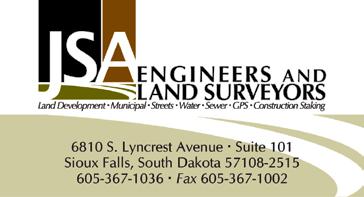
LYNN BREN | SDPAA EXECUTIVE DIRECTOR
The summer season brings people together from far and wide. They travel hundreds, sometimes thousands, of miles to come and celebrate together. While there are endless private opportunities for special events such as graduation and birthday parties, wedding and baby showers, marriages and celebrations of life, public parks and buildings are the most commonly sought after resources for many activities and events hosted by private parties. Each day, our office receives at least one inquiry as it relates to the use of public space or property for privately hosted activities.
When considering rental of a public space, whether it’s a park or a community center, you are encouraged to take a look at your rental or facilities use agreement. Does the agreement include appropriate hold harmless and indemnification language? Should you be requiring the hosts to carry liability insurance that would also protect your entity in the event a claim does arise out of the hosted activity? Are the



activities inherently dangerous where participation waivers should be required as part of the rental agreement? Does your agreement provide a requirement that proper medical response personnel be on site or within range if appropriate?
Does the rental agreement also include stipulations for those instances where alcohol may be served? In situations where private use of public property is involved, and especially where alcohol is being allowed, our recommendations include, but are not limited to, requiring the host to secure appropriate liability coverage, with limits not less than $1,000,000 per occurrence. These coverages should also list you, as the property owner, as an additional insured. Members should also review their policies where alcohol is being allowed. Does your agreement ensure there are checks in place to ensure that all serving laws are being followed? Are you hosting an event where alcohol will be served? For recommended policies and coverage information on liquor related events, please contact our office via the website at www.sdpaaonline. org, email at sdpaa@sdmunicipalleague.org or by calling us at 800-658-3633, Option 2.
We also encourage our Members to review the relationships that they have with various groups and organizations who host sporting or other group activities on Member property. Groups such as 4-H, Boys and Girl Scouts, as well as soccer, softball, and baseball associations all may believe that they are a branch or a part of your City or County or entitled to coverage under your liability documents, however this may not be the case. As a reminder, 4-H is a branch of the State’s Extension program. They are not automatically covered by your coverage document simply because they are hosting events on your property. The same is true for other sporting and scouting organizations. Each should be evaluated for appropriate coverage. If they are not under the complete control and discretion of your entity, you should consider engaging in rental or facilities use agreements with these groups as well. The events that these groups host bring many of the same, if not more, exposures than those hosted by private individuals.
Liability is not the only exposure that these groups bring to the table. Many times, you may be asked to store or hold property owned by these entities for storage between events or practices. You should have established a clear understanding with these groups who would be responsible in the event there is loss or damage to their property while stored on your premises.
For the groups that are part of your summer parks and rec programs, or for special events and activities, we would encourage you to review what your events entail and then contact us (or your carrier if you have not made the switch yet!) to ensure that there are no coverage issues which would arise out of your event!
The recommendations that our team makes, here and in those one-on-one conversations, are intended to help transfer the risk, or at the very least make clear the rights and responsibilities of each party as it relates to the various engagements between the participating parties. Our goal is to help Members recognize risk, and respond appropriate, whether by risk transference via the facilities use agreement, or acknowledgement via the agreements on holding of property.
With the various questions surrounding the use of public property for assorted reasons, we encourage you to contact our Member Services team to discuss with them any coverage or loss control questions that you may have. If there is a question that requires more time or some legal research, we can refer your question on to the Government Practices Hotline. If you aren’t a Member but would like to have access to the loss control and risk management resources that the Members of the SDPAA currently enjoy, contact our office now for a quote!
The South Dakota Public Assurance Alliance is a Member Owned Risk Sharing Pool, protecting public entity assets since 1987. Find us on the internet at www.sdpaaonline. org! ■


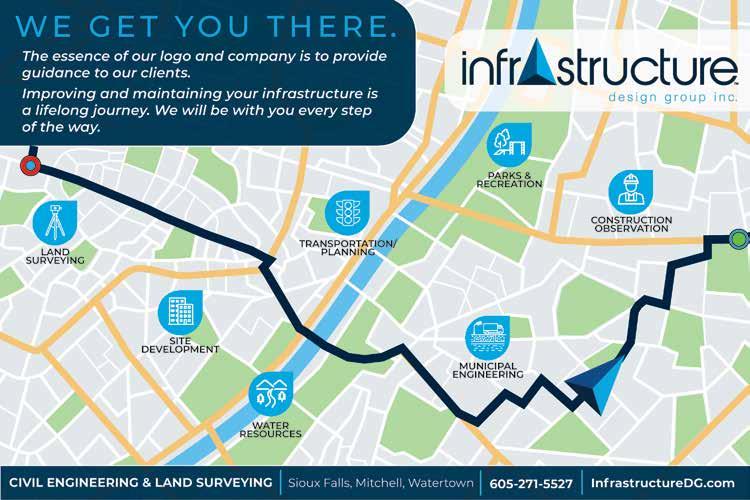

SDML WORKERS’ COMPENSATION FUND NOTICE OF BOARD OF TRUSTEES ELECTION
WEDNESDAY, OCTOBER 1, 2025
RAMKOTA HOTEL AND EVENT CENTER, PIERRE, SD
The SDML Workers' Compensation Fund Board of Trustees election will be held Wednesday, October 1, 2025, at the annual membership meeting during the SDML Annual Conference in Pierre, SD.
Two county seats are up for election. The positions are currently held by:
• Jim Schmidt, Lincoln County Commissioner
• Susan Lamb, Sully County Auditor
If you are interested in a position on the SDML Workers' Compensation Fund or would like to nominate someone who is a Member of the SDML Workers’ Compensation Fund and is either an elected or appointed official, please send a letter of application by the deadline date of September 5, 2025 to:
Lisa Nold
SDML Director of Risk Sharing Services
208 Island Drive
Ft. Pierre, South Dakota 57532
Phone: 1-800-658-3633
E-mail: lisa@sdmunicipalleague.org
Positions on the Board of Trustees are for three years, and the successful candidates will be seated on January 1, 2026. All nominations for the election will be forwarded to the Nominating Committee. ■
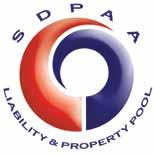
The South Dakota Public Assurance Alliance (SDPAA) Board of Directors election will be held Wednesday, October 1, 2025, at the SDPAA Annual Membership meeting during the SDML Annual Conference in Pierre, SD. The election shall be determined by a majority of those SDPAA Member entities present and voting with each Member entity having one vote. Election winners will be seated on the Board of Directors starting January 1, 2026, to serve a three-year term. A copy of the Board of Directors Election Policy Resolution is available upon request.
If you are interested in a position on the SDPAA Board of Directors, you must meet the following qualifications:
Article V – Paragraph 2 - Qualifications of Members of the Board: Members of the Board shall be either:
a. Elected officials of an Alliance Member, provided the governing Board of the Member in question has supported their appointment or candidacy by Resolution; or
b. Representatives, employees or appointed officials of an Alliance Member, provided the governing Board of the Member in question has supported their appointment or candidacy by Resolution.
SDPAA Board of Directors positions up for election are currently held by:
• Bruce Outka, Lawrence County Deputy States Attorney, Deadwood
• Adam Karst, Director of Administration, Watertown
• Steve Harding, Mayor, Pierre
Please send a letter of application and supporting Resolution by the deadline date of September 5, 2025 to:
Lisa Nold, Director of Risk Sharing Services
South Dakota Municipal League 208 Island Drive
Ft. Pierre, South Dakota 57532
Phone: 1-800-658-3633
Email: Lisa@sdmunicipalleague.org
All applications will be forwarded to the SDPAA Nominating Committee. ■
PIERRE, S.D. – Governor Larry Rhoden recently awarded more than $2.7 million in Community Development Block Grant (CDBG) funding to five projects across the state.
“These infrastructure and housing projects help strengthen South Dakota’s communities and improve quality of life,” said Governor Rhoden. “We’re proud to support the kind of local progress that benefits both current and future generations.”
Projects include:
• The City of Lennox was awarded $840,000 to reconstruct Oriole Avenue from State Highway 44 to
Main Street, upgrading to 8-inch concrete pavement and extending storm sewer facilities to improve drainage and reduce flooding.
• The City of Mitchell was awarded $770,000 to partner with LifeQuest in constructing a MicroVillage that will provide affordable housing for adults with disabilities.
• The Town of Veblen was awarded $1,000,000 to improve its wastewater lines with liner and replacement lines, extending the life of the system and meeting future demand.
• The City of Eureka was awarded an additional $41,198 for the demolition of four slum and
blight buildings on Main Street, increasing the total project award to $241,198.
• The City of McLaughlin was awarded an additional $77,000 for water system improvements, increasing the total project award to $847,000.
The CDBG program provides funding to local governments to complete projects that improve living conditions for low to moderate income persons. The program is funded through the U.S. Department of Housing and Urban Development and administered by the Governor’s Office of Economic Development. ■
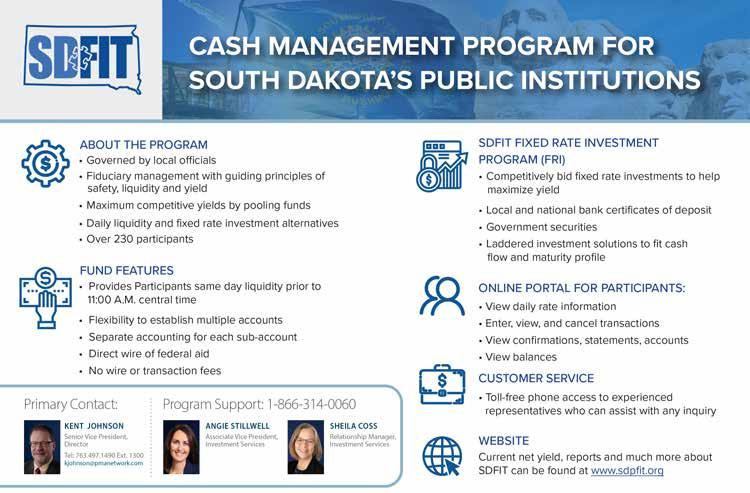
After years of planning, the long-awaited transformation of North River Street is finally here!
The South Dakota Department of Transportation (SDDOT) Hot Springs Urban Road Reconstruction Project was first planned in 2015, with hopes to break ground in 2018. However, delays pushed the start to 2021, right in the middle of a global pandemic that caused construction costs to skyrocket and supply chains to face widespread disruptions.
While the State carried out major roadwork through town, the City took the opportunity to complete three significant projects of its own: 1) upgrading critical infrastructure beneath the surface, replacing 2.5 miles of water and sewer mains— including sections that were over 130 years old, 2) installing historic architectural-style street lighting, and 3) constructing a unique suspended sidewalk designed to enhance roadway/ pedestrian safety and beautify the area by creating a walkway above Fall River.
As you might expect, the original pre-pandemic estimates were far from accurate. Thanks to a strategic agreement with SDDOT to exchange a portion of U.S. Highway 18 for $2.8 million, a $770K Community Development Block Grant, and earlier city council efforts to reserve funds, the project was able to stay on track.
With the roadwork complete and the construction cones behind us, the timing couldn’t be better to lift off and celebrate another exciting milestone: a decade of colorful skies and community pride on full display at the Fall River Hot Air Balloon Festival.

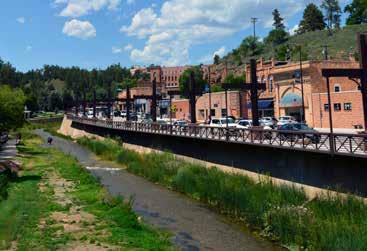
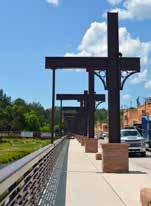
This festival has become a signature summer event in Hot Springs, drawing thousands of visitors from across the region. What began with just four balloons has grown into a vibrant, multi-day celebration featuring over two dozen balloons and attracting more than 5,000 attendees. The 2025 festival marks its 10th anniversary and will run Friday, Aug. 22, to Sunday, Aug. 24. Events take place across Hot Springs, including the municipal airport, Centennial Park, and the historic downtown district. Over the past decade, the Fall River Balloon Festival has grown from a small dream into a beloved community tradition—celebrating local pride, creativity, and the welcoming spirit of Hot Springs.
Festival highlights include early morning balloon launches at around 6 a.m. on Saturday and Sunday (weather permitting), skydiving, aeronautic displays, and the enchanting Night Glow, where tethered balloons light up the night sky. Visitors can also enjoy live music, local vendors, family-friendly entertainment, and a kids’ zone with fun activities. As with all ballooning events, launches are weather-dependent. Attendees are encouraged to check social media for live updates and arrive early for the best views.
Together, these milestones reflect the spirit of Hot Springs: resilient, proud, and soaring ever higher! ■
PIERRE S.D. – The South Dakota Department of Agriculture and Natural Resources (DANR) has confirmed Emerald Ash Borer (EAB) in Watertown, South Dakota.
DANR has expanded the existing State Plant Pest Quarantine to include Codington County. The updated quarantine area includes all of Brookings, Grant, Minnehaha, Lincoln, Turner, Union, and now Codington County. The pest has also been identified in 14 communities including Baltic, Brookings, Brandon, Canton, Crooks, Dakota Dunes, Hartford, Humboldt, Lennox, Milbank, Sioux Falls, Tea, Worthing, and now Watertown.
The quarantine is designed to slow the spread of Emerald Ash Borer. It is in place year-round and prohibits the movement of firewood and ash materials out of the quarantined counties. Movement of firewood from any hardwood species, whether intended for commercial or private use, is also restricted. If an ash tree is infested before it is cut, the wood may still contain EAB larvae. An individual split piece of ash firewood can have five or more adults emerge yet this summer. The Department has also established an external embargo on untreated firewood entering South Dakota from all states east of the eastern border of South Dakota and all counties where EAB is known to exist in other states.
“The detection of EAB in Watertown reinforces the importance of working together to combat the spread of EAB. Remember, when camping this summer, buy it where you burn it,” said DANR Secretary Hunter Roberts. “Quarantines are effective at slowing the spread, and it’s essential that everyone continues to follow the restrictions in place.”
EAB is a boring beetle that feeds on all species of North American ash. It was first detected in the United States in 2002, and in South Dakota in 2018.
For more information about EAB or to report a suspected sighting visit https://emeraldashborerinsouthdakota.sd.gov. ■


















ENDS AUG 10
Red Cloud Indian Art Show, Pine Ridge
Mount Rushmore Evening Lighting Ceremony, Keystone
Outlaw Square Monday Movie Night, Deadwood
DownTown in MadTown, Madison
Through Aug 13
Wild West Wednesdays Rodeo, Rapid City
(EXCEPT AUG 6)
Music on Main, Sturgis
(EXCEPT AUG 6)
Outlaw Square Summer Concert Series, Deadwood
(EXCEPT AUG 8)
Downtown Friday Nights, Spearfish
Falls Park Farmer's Market, Sioux Falls
Market at the Meridian, Yankton
1
Levitt at the Falls: Rascal Martinez, Sioux Falls
AUG 1-3
Potato Days, Clark
AUG 1-3
Sioux River Folk Festival, Newton Hills State Park, Canton
AUG 1-3
Escape Room, Fort Sisseton Historic State Park, Lake City
AUG 1-9
Sioux Empire Fair, Sioux Falls
AUG 1-10
Sturgis Motorcycle Rally, Sturgis
Canton Open Air Market, Canton 2 3 5
Levitt at the Falls: Socks in the Frying Pan, Sioux Falls
Rockin' Ribfest, Wessington Springs
Mount Rushmore Rodeo at Palmer Gulch, Hill City
Midco Free Day at the Zoo, Watertown
Levitt at the Falls: Sister Sadie, Sioux Falls
Downtown at Sundown, Brookings
AUG 7-9
Clay County Fair, Vermillion
Aug 7-10
Painting on the Prairie, De Smet
Levitt at the Falls: US Navy Band Horizon, Sioux Falls
AUG 8-9
Fort Pierre Trader Days & Backyard BBQ Competition, Fort Pierre
Adams Homestead Celebration, North Sioux City
Rockin’ Riverside Summer Concert Series, Hot Springs
Levitt at the Falls: Dessa and the 29:11 South African Ensemble, Sioux Falls
Mount Rushmore Rodeo at Palmer Gulch, Hill City
AUG 9-10
Threshing Show, Twin Brooks

AUG 11-14
Turner County Fair, Parker
AUG 11-17
Brown County Fair, Aberdeen
Downtown at Sundown, Brookings
Levitt at the Falls: Alysha Brilla, Sioux Falls
Levitt at the Falls: Boxing Banjo, Sioux Falls
Ultimate '80s Night at the Zoo, Sioux Falls
AUG 15-17
Summer Arts Festival, Yankton
AUG 15-17
Yankton Riverboat Days, Yankton
AUG 15-17
Tour de Corn Bicycle Ride and Weekend, Mitchell
AUG 15-17
Black Hills Threshing Bee, Sturgis
AUG 15-24
Central States Fair & Rodeo, Rapid City
Thunderhawk Wide Open, Lemmon
Rockin’ Riverside Summer Concert Series, Hot Springs
Sunflower Festival, Highmore
Levitt at the Falls: Me Like Bees, Sioux Falls
Mount Rushmore Rodeo at Palmer Gulch, Hill City
AUG 16-17
Threshing Bee, Rosholt
1880 Train Old West Shootout, Hill City
Leading Ladies & Dakota Spirit Marathon, Spearfish
AUG 19-24
Kool Deadwood Nites, Deadwood

Huron.
AUG 19-24
Hugh Glass Rendezvous, Lemmon
AUG 20-24
Corn Palace Festival, Mitchell
Downtown at Sundown, Brookings
Levitt at the Falls: The Claudettes, Sioux Falls
AUG 21-24
Steam Threshing Jamboree, Prairie Village, Madison
Levitt at the Falls: The Moore Brothers Band, Sioux Falls
AUG 22-23
Watertown Rodeo, Watertown
AUG 22-24
Fall River Hot Air Balloon Festival, Hot Springs
All My Relatives Festival, Sioux Falls
Levitt at the Falls: Mato Wayuhi, Sioux Falls
Sizzlin' Summer Nights, Aberdeen
AUG 23-24
Frontier Days Rodeo, Interior
AUG 26-31
Sturgis Mustang Rally, Sturgis
AUG 27-SEPT 1
South Dakota State Fair, Huron
Levitt at the Falls: Talking Dreads, Sioux Falls
Levitt at the Falls: The Ocean Blue, Sioux Falls
Levitt at the Falls: Empire Strikes Brass, Sioux Falls
Southern Hills Triathlon, Hot Springs
Dakota Five-O, Spearfish
1880 Train Old West Shootout, Hill City
Studebaker Car Show, Custer
Excellence in Municipal Government Award
Due: Aug. 15
Recognizes an elected official (odd years) or municipal employee (even years) who has made significant contributions to their municipality and community. Presented in October at the SDML annual conference during the Excellence in South Dakota Municipal Government Award Luncheon.
Learn more/apply: sdmunicipalleague.org/about
Safety & Loss Control Recognition Awards, Safety Benefits, Inc.
Due: Sept. 10
Recognizes SDML Work Comp and SD Public Assurance Alliance members who strive to ensure a safe workplace and manage entity liability. Applications accepted for three levels of awards. Presented by Safety Benefits, Inc. at the SDML Conference each fall.
Learn more/apply: www.safety-benefits.com
SDML Hall of Fame
Due: Sept. 15
Honors elected and appointed officials and employees who have served municipalities in South Dakota for 20 or more years. Inductees will be recognized at the fall SDML annual conference and listed in the November issue of the South Dakota Municipalities magazine.
Learn more/apply: sdmunicipalleague.org/about

us know! emilie@sdmunicipalleague.org

Fire & EMS Grant, Independent Insurance Agents of South Dakota
Due: Aug. 31
Three $7,500 grants are offered to South Dakota Volunteer Fire Departments/Volunteer Emergency Medical Services in select counties.
Learn more/apply: https://members.iiasd.org/Grants
Community Forestry Grant, SD Dept. of Agriculture and Natural Resources
Due: Ongoing, grant round closes approximately Sept. 30 each year
Funds community forestry projects that solve a specific community forestry problem or demonstrate the importance of trees in our communities. Maximum limit of $5,000. Match required; may be met through volunteer labor, donated and/or purchased supplies, or actual cash expenditures.
Learn more/apply: https://danr.sd.gov
Deadwood Fund Grant, SD State Historical Society
Due: Oct. 1 annually
Awarded in amounts ranging from $1,000 to $25,000 to encourage large-scale restoration or rehabilitation of historic properties.
Learn more/apply: https://history.sd.gov/preservation/ fundingopportunities.aspx
Celebrate America! Grant, National Endowment for the Humanities
Due: Accepted and reviewed on a rolling basis
Awards 250 challenge grants of up to $25,000 each for projects that focus on the founding of the American nation, key historical figures, and milestones that reflect the exceptional achievements of the United States. The agency aims to award grants in every U.S. state and jurisdiction. Successful applicants required to match every dollar of grant funding with a dollar of nonfederal funds.
Learn more/apply: www.neh.gov/program/ celebrate-america
Daughters of the American Revolution Grants, Mary Chilton DAR Foundation
Due: Ongoing, awarded periodically throughout the year Funds projects related to patriotism, historic preservation, or education. Regular Grants - projects from $1,000 to $15,000, awarded three times a year; and Mini Grantsamounts up to $1,000, awarded six times a year.
Learn more/apply: https://mcdarfoundation.org/ apply-for-grants
GOSCMA (Great Open Spaces City/County Management Association) Conference
Aug. 6-8, Kalispell, MT
Registration: $175+
The annual conference of local government managers in Montana, North Dakota, South Dakota, and Wyoming. Learn more: https://www.eventbrite.com/e/2025-goscmaannual-conference-tickets-1109418032199
SDML Annual Conference
Sept. 30-Oct. 3, Pierre
Gathers municipal employees and elected officials from across the state to network, learn new tips and trends, share best practices, and discover new products from exhibitors.
Learn more/register: sdmunicipalleague.org/ about-annualconference
South Dakota Park and Recreation Association (SDPRA) Annual Conference
Oct. 6-9, Spearfish
Gathers parks and recreation professionals from throughout the region to explore the endless potential the profession provides communities 365 days a year. Learn more/register: www.sdpra.com
Fuel the Growth Economic Development Course
Oct. 6-9, Rapid City
Registration: $850/person
A Basic Economic Development Course that covers 10 economic development topics, including business development, organizational development, and community development.. Participants will learn from experts and colleagues through presentations, panel discussions, case studies, and networking opportunities. Accredited by the International Economic Development Council. Hosted by Black Hills State University and Rushmore Regional Alliance. Learn more/register: www.BHSU.edu/FueltheGrowth
City Summit, National League of Cities
Nov. 20-22, Salt Lake City, UT
The largest educational and networking event for city officials in the United States, it brings together thousands of city leaders, corporate partners, and city staff for four days of educational seminars, policymaking, and networking activities. Held annually by the National League of Cities. Learn more/register: https://citysummit.nlc.org















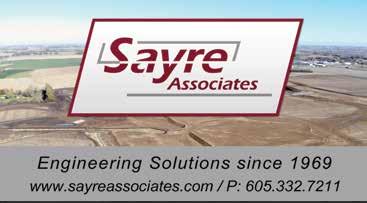






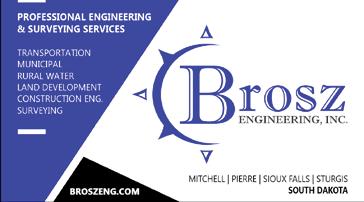












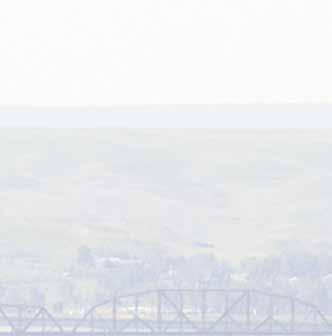


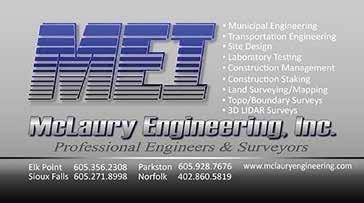
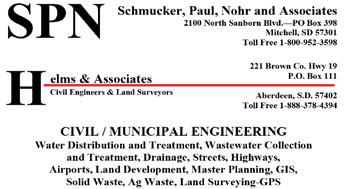




























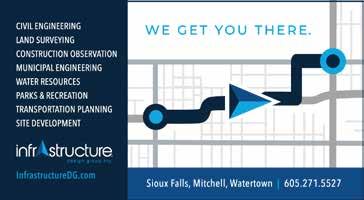




On July 1, the U.S. Senate passed the One Big Beautiful Bill Act, and President Trump signed it into law on July 4. This historic legislation delivers on a once-in-a-generation opportunity to make America safer, stronger, and more prosperous, and I’m proud to report that this bill has a lot of good news for South Dakotans.
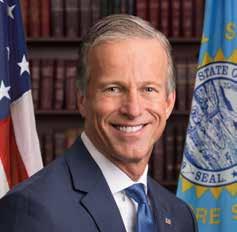
The centerpiece of this bill is permanent tax relief for the American people. Without action by Congress, the 2017 Republican tax cuts would have expired at the end of this year, raising South Dakotans’ tax bills by an average $2,500. But our bill prevents that tax hike – next year and forever –with permanent tax relief. That means lower tax rates for every income level, a $2,200 child tax credit, and an increased standard deduction. But this bill goes further. It also suspends tax on tips and overtime pay, meaning bigger paychecks for hardworking Americans, and it offers seniors a higher standard deduction to reduce their tax bills even further.
The other legacy of our 2017 tax reform effort is its impact on our economy. Before the pandemic, our economy was firing on all cylinders. The bill we’ve just passed will set us up to get our economy moving again. It keeps taxes low for small and medium-sized businesses – again permanently, so farms, ranches, and small businesses have certainty for the future. It maintains investment incentives that free up cash for businesses to invest in their operations and their employees. Not to mention making the job-creating 199A small business deduction permanent, alongside other pro-growth tax policies.
Strengthening America’s farms and ranches is another key component of this bill. It’s been a challenging few years in the agriculture sector, and this bill addresses those challenges headon. It increases reference prices for all covered commodities. It enhances crop insurance coverage and affordability. And it supports risk management, disaster assistance, and conservation programs that producers depend on. And a permanently higher threshold for the death tax that’s linked to inflation will save family farms and ranches from this unfair tax and the cost of planning for it.
In addition to a stronger economy, this bill strengthens American security from every angle. It makes a generational investment in our border security, including finishing the wall and bolstering border enforcement. It makes a significant investment in our military capabilities, ensuring our men and women in uniform have everything they need to deter and defeat today’s threats and tomorrow’s. And it unleashes American energy dominance, which will help secure a reliable and affordable energy supply for the future.
This legislation also reins in the size of government. It delivers savings to the American people by tackling waste, fraud, and abuse in federal programs. It includes the largest spending cut in American history alongside commonsense reforms that haven’t been attempted in Washington, D.C., in decades. And it will help reduce the deficit with greater tax revenue generated by a growing economy – not by higher taxes.
Our bill makes America stronger by supporting the people who make America great. I’m proud of the work we’ve done on this bill, and I can’t wait to see these policies help usher in a new era for our great country. ■
Office Specialist II – City of Watertown, SD. Provides administrative, fiscal, and program support to the department and provide exemplary customer service to members of the public: Provides first line customer service to internal and external customers; greets, receives, and screens calls, visitors and customers; addresses and resolves customer questions or complaints as able and refers complex inquiries, requests, or complaints to other appropriate staff as needed; Track phone call details, such as date, contact name, and the context of the call. Salary: Grade 120 / Step 1 = $45,219.20 per year or $3,768.27 per month. See full description and apply at https://watertownsd.seamlessdocs.com/f/job_application. Open until filled.
Communications Officer – City of Pierre, SD. Work as part of a team operating the Central South Dakota Communications Center, the 911-Emergency Dispatch Center for central South Dakota. Receive calls for assistance from the public, document
and dispatch appropriate public safety personnel for those calls. Receive, process and send radio communications for various Law Enforcement Agencies, Emergency Medical Services, and local Fire Departments. 40 hours per week - Shift work. Comprehensive benefit package. UP TO $3000 HIRING BONUS! Learn more and apply at www.cityofpierre.org. Open until filled. EOE.
Airport ARFF/Operations/Maintenance Technician – City of Pierre, SD. Responsible for providing general daily oversight of airside operations by monitoring overall airfield safety, performs vehicle and equipment maintenance, airfield lighting maintenance and performs aircraft rescue firefighter duties. Maintains lighting systems, vehicles, equipment, grounds, structures, pavement and turf. Assists in overseeing wildlife management at airport through annual training, assisting in depredation permits, and overseeing bird strike report program. Maintains documentation and records of all actions taken on airfield to ensure compliance with FAA Part 139 certification requirements. Wage offer will be based upon actual education and experience. Comprehensive benefit package. UP TO A $3,000 HIRING BONUS! Learn more and apply at www. cityofpierre.org. Open until filled. EOE.
Code Consultant/Plans Examiner – City of Rapid City, SD. Responsible to administer the compliance of codes, rules, and
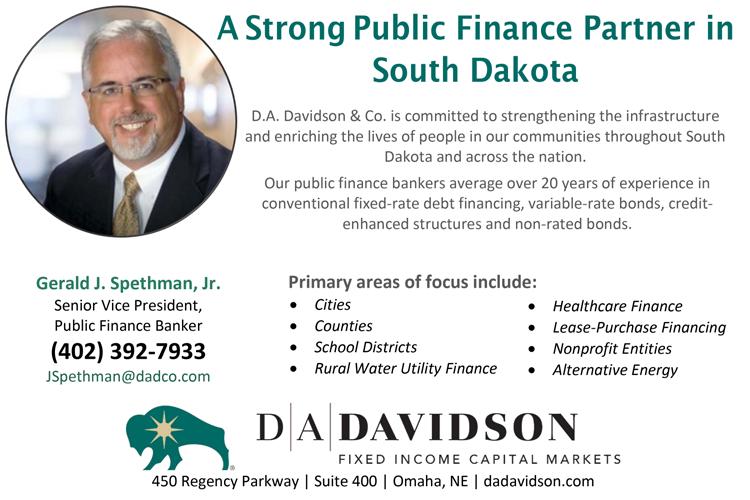
regulations governing the building construction industry, including the International Building Code, International Residential Code, International Existing Building Code, and ANSI codes and standards, and to supervise and coordinate Building Inspection staff. Learn more at www.rcgov.org. Open until filled.
Lead Building Maintenance Worker – City of Sioux Falls, SD. Position works at the Midco Aquatic Center, a premier, high-traffic, yearround indoor aquatic facility. This opportunity calls for an individual with expertise in managing complex building systems, including pool chemistry, HVAC, plumbing, and electrical components. Will oversee the daily maintenance, repair, and operation of the facility’s infrastructure, ensuring all systems function safely and efficiently. Serve as the on-site expert, collaborating with Parks and Recreation staff, leading maintenance team members, and proactively addressing issues to maintain the facility’s long-term integrity. Submitted applications will be actively reviewed and this position will be filled as the hiring authority sees fit. HIRING RANGE DOQ: $26.89 - $29.16 hourly. Learn more at www.siouxfalls.gov/ government/careers. Open until filled.
Deputy Finance Officer – City of Pierre, SD. Responsible for the accounts receivable processing, monthly bank reconciliations, inventory processing, journal entry processing, accurate general ledger analysis, monthly sales tax submission to State, review and approve weekly A/P invoices, and monthly Departmental financial reports. Successful candidate will be instrumental in managing the

fixed asset inventory, annual inventory verification process, and year-end comprehensive annual financial report. Salary: $85,725.76 minimum plus comprehensive benefit package. Wage offer will be based upon actual education and experience. UP TO $3000 HIRING BONUS! Learn more and apply at www.cityofpierre.org. Open until filled. EOE.
Finance Director - City of Apple Valley, MN. Seeking a strategic, detail-oriented Finance Director to join their team to lead their fi nancial strategies, enhance fi scal responsibility, and support the city’s development. Reporting to the City Administrator, this role is essential in guiding financial strategy, budget preparation, and investment management. Primary duties include developing financial reports, responding to departmental requests for financial analysis, and advising on budget matters. Become a part of the exceptional leadership team that plays a crucial role in making Apple Valley an outstanding place to live, work, and play for generations to come. $134,280 yearly. View the full position profile and learn more at gmphr.com. Open until filled. EOE.
Finance Officer – City of Fort Pierre, SD. Directs activities of staff in various departments within the City, supervising personnel and overseeing the fiscal accounting, budgetary and business functions that are essential to the City, under the direction of the Mayor and according to statute, ordinances, codes, and policies adopted by the Council. Calls for a great deal of contact with the public therefore maintaining good public relations is essential. Bachelor’s Degree in Accounting or Business Management preferred, will consider an equivalent combination of relevant education and work experience. $2,000 Hiring Bonus. Salary range begins at $80,000/yr depending


on qualifications and experience, plus excellent benefits. Learn more and apply at www.fortpierre.com (Employment Opportunities). Open until filled.
Finance Officer – City of Hecla, SD. Responsible for all the city’s finance operations, including payroll, budgets, accounts payable and receivable, financial reporting, preparing, and filing all necessary state and federal reports and other day to day operations of the city. Prepares, directs, and reviews resolutions, ordinances, municipal elections as well as preparing for monthly council meetings. Coordinate and collaborate with boards, outside organizations, state, and federal agencies and abide by all South Dakota Codified Laws. Experience in customer service and computer knowledge required. Full-time position. Wage DOE with a benefit package. Apply at the City Office 206 Main Street, Hecla, SD. Questions may be directed to 605-994-2333. Open until filled. EOE.
Information Technology Director – City of Billings, MT. Reporting to the Assistant City Administrator, the position provides leadership and performs highly responsible and complex administrative, strategic, and technical work in the development, implementation, and management of activities and operations of the Information Technology (IT) Department. Responsible for developing and implementing technology strategies to provide direction and guidance to the City Administrator and all City departments on technology priorities, long-term technology initiatives and investments, and uses of technology to solve operational needs and problems. The department operates with a budget of $4.3 million and a team of 21.5 FTEs. Salary: $133,766 to $178,730 annually DOQ. Learn more at gmphr.com. First review July 27. Open until filled.
Library Clerk - City of Hot Springs, SD. Serves patrons of the Public Library in numerous capacities. Their role is to support the Library Director by maintaining and delivering the varied library services for the community. Maintain and deliver varied library services for the community. Process new materials. Enter book data into the electronic catalog. Serve patrons at the front desk in full capacity of circulation needs. Maintain circulation statistics. Maintain patron records. Compile statistics. Inventory of materials as needed. Perform open & close duties. Keep Director informed of problems and works to solve them. Attend staff meetings. Assist in training new staff and/or volunteers. Wage DOEQ-$14.89 TOS. Learn more at https://hs-sd.org/community/city_employment.php. Open until filled.
Communications Officer, Police Department - City of Spearfish, SD. This position is responsible for performing emergency and non-emergency communications functions. Learn more and apply at www.cityofspearfish.com/161/Career-Opportunities. Open until filled. EOE.
Patrol Officer - City of Mitchell, SD. Responsible for the enforcement of federal, state, and local laws and the protection of life and property. Some of the job duties include: patrol the city to detect and
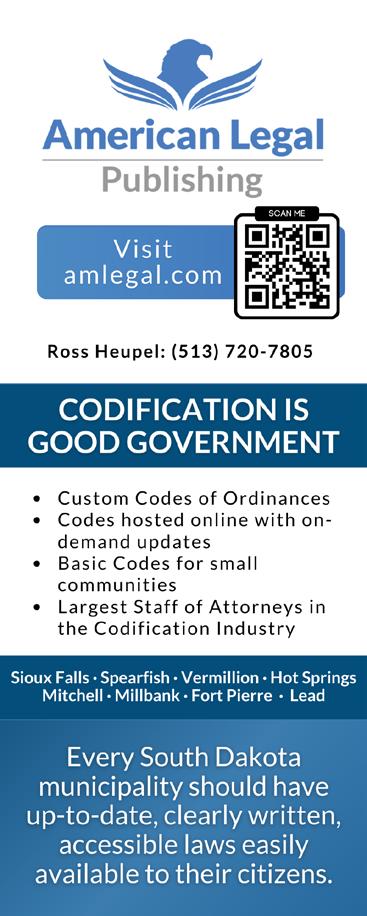
deter criminal activity and traffic violations and to provide assistance as needed; monitors commercial and residential areas for signs of criminal activity; responds to calls for service, including domestic disputes, assaults, burglaries, traffi c accidents, lost or missing persons searches, public service requests; completes required reports and forms, including accident and incident reports. Starting wage: $29.636 per hour. $3,000 relocation stipend. Competitive benefits. Learn more and apply at www.cityofmitchellsd.gov. Open until filled.
Patrol Officer – City of Pierre, SD. Performs law enforcement & public safety duties as necessary to maintain law & order in the City of Pierre. Must be at least 21 years of age, have a high school diploma or GED, & pass the police entry level examinations including a background investigation. Prior experience in law enforcement is desirable. Certified officer preferred. Up to $2000 annually for educational reimbursement. Up to $6000 hiring bonus. Comprehensive benefit package. Learn more and apply: Human Resources Offi ce, City of Pierre, Box 1253, Pierre, SD 57501, (605)773-7429, www.cityofpierre.org. Open until filled. EOE.
Police Officer – City of Belle Fourche, SD. Performs general police work in the protection of life and property, including conducting investigations of reported crimes and narcotic violations, responding to emergencies, and conducting public education programs. Enforce local, state and federal laws, prevent and suppress crime and accidents, and promote public safety. Patrol areas of Belle Fourche, answer calls in emergency and non-emergency situations, and initiate action on matters coming to the attention of the officer, including preparing citations. Compensation: $26.58 - $31.70 DOQ. Hours: 40 hours+ per week. Learn more and apply at www. bellefourche.org/employmentopportunities. Open until filled.

Police Officer - City of North Sioux City, SD. Part-time police officer position. South Dakota certification is preferred, but not mandatory. This employment may move into a full-time position, should that opportunity become available. The North Sioux City Police Department will also be compiling a Hiring List of applicants to be considered for any part-time or full-time positions that may become available in the future. Please mail, email or fax applications and resumes to: North Sioux City Police Department, PO Box 650/ 118 So. Victor Avenue, North Sioux City, SD 57049. Email: rich. headid@northsiouxcity-sd.gov, peggy.gorsett@northsiouxcity-sd. gov. Open until filled.
Police Officer – City of Spearfish, SD. Enforce local, state, and federal laws, prevent and suppress crime and accidents, and promote public safety through community policing principles. This position will be responsible for the investigation of criminal cases as assigned. Full-time position. Learn more and apply on the “Career Opportunities” page at www.cityofspearfish.com. ~Sign-On Bonus $6,000~ Competitive benefit package. Open until filled. EOE.
Police Offi cer (part-time) – City of Worthing, SD. Position is responsible for performing varied assignments in motorized patrol, traffic control and enforcement, municipal ordinance enforcement, and other related law enforcement activities. Applicant must be of good moral character, self-motivated, and have good people skills. Current Law Enforcement Certification is preferred. Starting wage will be DOE. Work schedule is flexible. Applications are available on the City of Worthing website at www.cityofworthing.com or at City Hall, 208 S. Main Street, Worthing, SD 57077. For questions contact Worthing City Hall at: 605-372-4113. Open until filled. EOE.



Director of Parks, Trails, and Recreation - City of Belgrade, MT. A department head position that reports to the Assistant City Manager. Performs high-level administrative, professional, and technical work that is directly responsible for planning, directing, managing, and overseeing programs, activities, and operations of the Parks and Recreation District including parks and open space, a comprehensive trail system, recreation programming and activities, park facilities, and the Senior Center. While the Director reports to the Assistant City Manager, there is also a policy reporting responsibility to the Park District Board and County Commission. Salary: $131,856 - $157,842 annually DOE. View the full position profile, job description, and benefits at gmphr.com. First review is August 17, 2025. EOE.
Park Maintenance Technician – City of Pierre, SD. Responsible for performing a variety of building and grounds maintenance and repair duties including irrigation projects. Responsible for snow removal. Maintains grounds by mowing grass along with pruning and removal of trees and shrubs. Qualifications: Experience working on irrigation systems would be beneficial; skill in operating equipment and tools used in park operations such as tractors, mowers, snow removal equipment, tree removal equipment and power tools including chainsaws. Comprehensive benefit package. Up to $2,000 annually for educational reimbursement. Wage offer will be based upon actual education and experience. UP TO A $3,000 HIRING BONUS! Learn more at www.cityofpierre.org. Open until filled.
Planning Director – City of Sturgis, SD. Responsible for performing advanced and complex professional work in current and long-range planning, zoning, land use, and development for the City of Sturgis. Involves providing exceptional service and fostering collaboration in all internal and external interactions. Will oversee and administer planning and development functions, including building services, in alignment with the City’s goals and policies. Key responsibilities include the implementation and enforcement of the City’s zoning ordinance, subdivision regulations, and comprehensive plan. Salary: $88,000 yearly. Find more details and an application at https://www. sturgis-sd.gov/jobs. Open until filled.
Electrician, Water Purification Facility – City of Sioux Falls, SD. Responsible for the installation, maintenance, and repair of electrical systems and equipment crucial to facility operations. Key responsibilities include troubleshooting and resolving electrical issues, performing preventative maintenance on electrical systems, and ensuring compliance with safety regulations and industry standards. Should have experience with three-phase motors and control systems in an industrial setting, as well as general electrical work experience in industrial environments. Hiring range DOQ: $28.08 - $33.11 hourly; $31.54 - $37.38 hourly with license. Learn more and apply at www.siouxfalls.gov/government/careers. Open until filled.
Maintenance Employee – City of Marion, SD. Includes working with all aspects of maintenance within the city of Marion, including but not limited to streets, parks, water, sewer, swimming pool and city

equipment. Must be able to work with heavy equipment, have or be willing to obtain a CDL, have or be willing to obtain water and wastewater certifications, and be willing to live in the city of Marion. Full-time benefits eligible position. Wage DOE. Visit marionsd. com/employment for an application. Applications can be returned to marionsd@gwtc.net or mailed to PO Box 94, Marion SD 57043. Open until filled.
Maintenance Operator, Class III – City of Hot Springs, SD. A skilled position performing streets, parks and cemetery maintenance. Responsible for performing street and park maintenance including, but not limited to, operating hand tools, power tools, regular duty trucks, loaders, bobcats, blades, street sweeper, plow trucks, semitruck, water truck, etc. It is expected of this position to also be able to perform carpentry and masonry related tasks in addition to metal fabrication. Starting wage: DOEQ $15.79-19.74/hr. For a complete job description, application, and benefit listing visit www.hs-sd.org and search city employment opportunities. Open until filled.
Mechanic – City of Spearfish, SD. Responsible for participating in the maintenance and repair of the city’s vehicle and equipment fleet. Minimum Qualifications: Knowledge and level of competency commonly associated with completion of specialized training in the field of work; Sufficient experience to understand the basic principles relevant to the major duties of the position, usually associated with the completion of an apprenticeship/internship or having had a similar position for one to two years; Possession of or ability to readily obtain a valid Class B commercial driver’s license issued by the State of South Dakota with air brake and tanker endorsements; CFC-12 Refrigerant Recycling and Service Certification. Salary Range: $26.98 - $39.49 per hour depending on experience. View full description and apply at https://www. spearfish.gov/161/Career-Opportunities. Open until filled.
Public Works Director – City of Fort Pierre, SD. Provides technical assistance that will impact decisions on the day-to-day distribution of the workload of field staff, tactfully handles engineering related questions or problems, works with the City Superintendents, Assistant Public Works Director, or other staff for resolution of such issues. Maintains a professional presence and respectfully answers questions by staff and general public. $2,000 Hiring Bonus. Minimum starting salary $90,000/yr negotiable depending on qualifications and certifications, plus excellent benefits. Learn more and apply at www.fortpierre.com (Employment Opportunities). Open until filled.
Public Works Employee – City of North Sioux City, SD. Plays a vital role in the maintenance and operation of the city’s streets, water, and sewer infrastructure. Responsibilities include but are not limited to: Maintain and repair streets, water systems, and sewer infrastructure; Operate a variety of equipment and machinery; Perform routine inspections and address public work’s needs; Be available for on-call duties, including rotating weekends and snow events. Learn more and apply at https://northsiouxcity-sd.gov/ departments/human-resources. Resumes and applications can be sent to CityofNSC@northsiouxcity-sd.gov. Open until filled. EOE.
Superintendent of Public Utilities – City of Hosmer, SD. Responsible for the maintenance and operation of the municipal water plant and its distribution system, including the sewer system (adding chemicals and lagoon maintenance); conducts water testing as required. Prefer SD DANR water certification. Keeps Public Utilities in a good state of repair. Keeps logs of water meter readings for delivery to the Finance Offi cer for billing. Maintains accurate time-keeping sheets. Attends monthly City Council Meetings and provides a status report. Additional duties include: mowing, tree trimming, City Dump monitoring, minor repairs to City owned buildings as needed, and operate/maintain City-owned equipment to include payloader, skid steer, truck, and zero turn. Starting pay $23 per hour, $25 if SD DANR water certified. Health Care and 401k available. Contact/submit resume to hosmercitysd@gmail.com or Hosmer City Hall. Open until filled.
Wastewater Plant Specialist – City of Hartford, SD. Oversees the daily operations of the city’s Aeromod mechanical wastewater

treatment plant. Requires self-motivation, technical knowledge, and a commitment to maintaining the plant’s operation efficiency and regulatory compliance. Responsible for the testing, reporting, maintenance, and upkeep of the plant and grounds while ensuring that all processes meet environmental standards and safety regulations. Full-time, year-round position with full benefits. The ideal candidate should have experience in wastewater treatment operations. Wages will be commensurate with experience and qualifications. The starting pay range is $25.00-$40.00 per hour. Learn more and apply online at www.hartfordsd.us. Open until filled. EOE.
Water Distribution and Wastewater Collection-Stabilization Pond Operator – City of Fort Pierre. Operates, monitors, and maintains the mechanical, plumbing, and treatment facilities pertinent to the water and wastewater systems, along with operating and maintaining a variety of equipment and hand/power tools. $2,000 Hiring Bonus. CDL is required. Salary range begins at $25/hr depending on qualifications and certifications, plus excellent benefits. Applications and complete job description can be obtained at www.fortpierre. com (Employment Opportunities), or by request at 605-223-7690, admin1@fortpierre.com. The City of Fort Pierre is an affirmative action and equal opportunity employer. Open until filled.
Water/Sewer Department Position – City of Miller, SD. Position offers hands-on experience in public utilities and water/sewer system maintenance. No previous experience necessary—training provided. Great opportunity to begin a stable and meaningful career serving your community. Benefits Include: South Dakota Retirement System; Health, Dental & Vision Insurance; Life Insurance; Paid Vacation & Sick Leave. Wage: Starting at $18/hour, Depending on Experience (DOE). Visit www.cityofmillersd.com or contact the city office (605) 853-2705 for more information. Open until filled. EOE.







Find full descriptions, links to applications, more listings, or place an ad online:
CLASSIFIEDS POLICY: $50 per submission. SDML members receive classified ads for free as part of their membership. Includes a listing on the SDML classifieds webpage and in the next issue of the SD Municipalities magazine if received by the 10th of the month preceding the publication date. Submissions may be subject to editing.
2020 Everest 7’ Finishing Mower - Town of Lebanon, SD. Surplus Item. Model # 5700C Serial #50197004. Category 1 Connections. Property being sold AS IS. Was working when put in storage. Mower was used for two summers. Town purchased a new tractor with Category 2 Connections. Mower comes with a new set of blades. Bids can be mailed to: Town of Lebanon, 203 Vail Street, Lebanon, SD 57455. Board has the right to refuse any bid. Bid must be received on or before the regular meeting on Sept. 8, 2025. ■
No later than August 1 –The liquor tax reversion must be made. (SDCL 35-5-22; See Hdbk., sec. 11.600)
No later than August 1 – In those municipalities employing a city manager, the city manager is required to prepare and submit an annual budget to the governing body. (SDCL 9-10-15(5); See Hdbk., sec. 12.065)
Sales tax ordinance deadlines – The effective date of any new or amended municipal sales tax ordinance must fall on either January first or July first. The municipality must notify the Department of Revenue of the ordinance at least 90 days prior to the effective date. (SDCL 10-52-9; 10-52A-13; See
Hdbk. Sec. 12.260)
On or before September 1 – The finance officer must report annually to the governing body an estimate of the expenses of the municipality and likewise the revenue necessary to be raised for the current year in budget form similar to that recommended by the municipal accounting manual as provided in SDCL 4-11-6. (SDCL 9-22-23; See Hdbk., sec. 12.065)
At the first regular meeting in September, or within ten days thereafter – The annual appropriation ordinance for the ensuing year must be introduced. (SDCL 9-21-2; See Hdbk., sec. 12.066)
Boundary changes – Municipalities must notify the Department of Revenue of any resolution or amendment enacted which changes the boundaries of the municipality. Notification shall be in written form, shall contain a copy of the resolution or amendment, and may be sent by electronic means or registered mail. Municipalities shall also provide any changes and additions to streets and addresses. (SDCL 10-52-13; See Hdbk., sec. 14.172) ■

September 2025
On or before September 1 – The fi nance offi cer must report annually to the governing body an estimate of the expenses of the municipality and likewise the revenue necessary to be raised for the current year in budget form similar to that recommended by the municipal accounting manual as provided in SDCL 4-11-6. (SDCL 9-2223; See Hdbk., sec. 12.065)
Before September 2 – If the number of on-sale and off-sale liquor licenses is
not fixed by ordinance, the governing body may determine by resolution the number of on-sale and off-sale liquor licenses and the fees to be charged for each. (SDCL 35-4-11; See Hdbk., sec. 11.205)
First Monday of September – Labor Day – State holiday (SDCL 1-5-1)
At the first regular meeting in September, or within ten days thereafter – The annual appropriation ordinance for the ensuing year must be introduced. (SDCL 9-21-2; See Hdbk., sec. 12.066)
On or before October 1 – The governing board of any municipality may, on or before the first of October preceding the annual municipal election, approve an ordinance requiring a runoff election as found in SDCL 9-13-27.1 and SDCL 9-13-26.1 (SDCL 9-13-25; See Hdbk., sec. 7.600)


On or before October 1 – Immediately upon passage and publication of the annual appropriation ordinance, the auditor or clerk must certify the tax levies contained therein to the county auditor on or before October first in the following form:
For general purposes____
For interest and debt service fund___ (SDCL 9-21-20 and SDCL 10-12-7; See Hdbk., sec. 12.066)
Boundary changes – Municipalities must notify the Department of Revenue of any resolution or amendment enacted which changes the boundaries of the municipality. Notification shall be in written form, shall contain a copy of the resolution or amendment, and may be sent by electronic means or registered mail. Municipalities shall also provide any changes and additions to streets and addresses. (SDCL 10-52-13; See Hdbk., sec. 14.172) ■




